慢速生活英语口语广播35:流行与爵士音乐 (MP3下载)
音乐的发展史

古典音乐发展史:(一)1600~1750 巴洛克时期音乐风格:1.连续性和统一性2.力度少变化,与情绪节奏形成严密的统一。
3.旋律复杂,难度大,表现技巧。
4.以复调音乐织体为主。
代表人物:1.巴赫(1685~1750)[德] 《布兰登堡协奏曲》宗教音乐《马太受难曲》当然最著名的《十二平均律》是不可以少的啦!2.亨德尔(1685~1759)[英] 著名的《弥撒亚》,哈里路亚合唱曲就是出自其中。
其他的没什么特别著名的了。
3.维瓦尔第(1678~1741)[意] 小提琴协奏曲《四季》(二)1750~1820 古典主义时期音乐风格:略。
懒得打了,楼主要的话我再打。
代表人物:1.海顿(1732~1809)[英] 94#《惊愕》交响曲100#《军队》等等清唱剧《创世纪》也很著名的。
2.莫扎特(1756~1791)[奥] 歌剧《费加罗婚礼》《唐璜》《魔笛》《G大调弦乐小夜曲》还有偶最欣赏的《C大调长笛与竖琴协奏曲》......太多了写不完。
他的几乎每一部都是很纯净的曲子,都是绝对的经典。
最喜欢他了。
3.贝多芬(1770~1827)[德] 9部交响曲都很著名。
唯一的一部歌剧《费德里奥》还有被称做键盘乐的圣经的和海顿十二平均律齐名的32首钢琴奏鸣曲。
(三)1820~1900 浪漫主义时期代表人物:“歌曲之王”舒伯特、门德尔松、瓦格纳、舒曼、“钢琴诗人”萧邦、“钢琴之王”李斯特(最让我觉得神奇的一点是他居然是车尔尼的弟子!)、勃拉姆斯、“圆舞曲之王”小约翰·斯特劳斯、还有那些个写歌剧的什么罗西尼啊、威尔第啊、普契尼啊、比才啊......数不清了。
人才辈出的时代啊。
不要让我把他们的生卒年月和代表作都写出来吧?会累死人的!(四)1900至今近现代楼上的说我漏了一个印象,其实我是把印象算到了近现代的里面。
我感觉近现代没有细分的必要,那些什么民族啦印象啦什么的都是小分支。
当然这只是我的看法,和标准看法可能有点出入。
高一英语音乐欣赏单选题60题(答案解析)

高一英语音乐欣赏单选题60题(答案解析)1.Music that makes people feel relaxed is called _____.A.rock musicB.classical musicC.light musicD.pop music答案:C。
“light music”轻音乐通常让人感觉放松。
“rock music”摇滚音乐比较有节奏感和活力;“classical music”古典音乐较为庄重;“pop music”流行音乐风格多样,但不一定都让人感觉放松。
本题考查音乐类型词汇的理解。
2.The kind of music that is often played with electric guitars is _____.A.jazz musicB.country musicC.rock musicD.blues music答案:C。
“rock music”经常使用电吉他演奏。
“jazz music”爵士乐主要乐器有萨克斯等;“country music”乡村音乐常用吉他等但不一定是电吉他;“blues music”蓝调音乐乐器多样但不是以电吉他为主要标志。
本题考查音乐类型及相关乐器的了解。
3.Music that tells stories about people's lives in the countryside is _____.A.folk musicB.country musicC.pop musicD.classical music答案:B。
“country music”乡村音乐讲述乡村生活故事。
“folk music”民间音乐范围较广不一定是关于乡村生活;“pop music”流行音乐主题多样;“classical music”古典音乐通常不是关于乡村生活。
本题考查音乐类型的特点。
4.The music that is usually played by a symphony orchestra is _____.A.rock musicB.classical musicC.jazz musicD.pop music答案:B。
学术英语视听说1听力原文(部分)
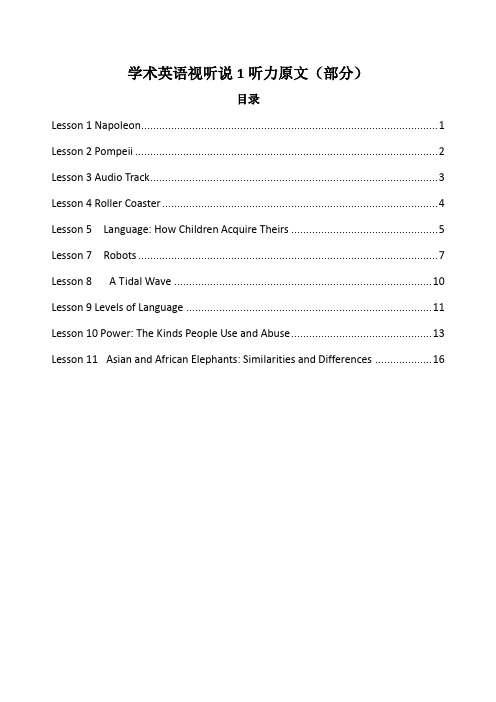
学术英语视听说1听力原文(部分)目录Lesson 1 Napoleon (1)Lesson 2 Pompeii (2)Lesson 3 Audio Track (3)Lesson 4 Roller Coaster (4)Lesson 5 Language: How Children Acquire Theirs (5)Lesson 7 Robots (7)Lesson 8 A Tidal Wave (10)Lesson 9 Levels of Language (11)Lesson 10 Power: The Kinds People Use and Abuse (13)Lesson 11 Asian and African Elephants: Similarities and Differences (16)Today, I’m going to talk to you about one of the most important historical figures in European history: Napoleon Bonaparte. Let ’s start by talking about his early life. Napoleon was born in 1769 on the island of Corsica. When he was only 10 years old, his father sent him to military school in France. Napoleon was not a very good student in most of his classes, but he excelled in mathematics and military science. When he was 16 years old,he joined the French army. In that year 1785,he began the military career that would bring him fame ,power,riches and finally defeat. Napoleon became a general in the French army at the young age of 24. Napoleon had many victories on the battlefield but he also became involved in French law and politics. And in 1804, at the age of 35,he became the first emperor of the France.Napoleon was many things. He was, first of all, a brilliant military leader. His soldiers were ready to die for him. As a result, N.won many military victories. At one time he controlled most of Europe, but some countries, including England, Russia, and Austria fought fiercely against him. His defeat —“his end”came when he decided to attack Russia. In this military campaign against Russia, he lost most of his army.The great French conqueror died alone –deserted by his family and friends in 1821. Napoleon was only 51 years old when he died.The lecture for this class is about the city of Pompeii. A natural disaster occurred there almost 2000 years ago.Today many rich people who live in large metropolitan areas such as Beijing, Paris and New York leave the city in the summer. They go to the mountains or to the seashore to escape the city noise and heat.2,000 years ago, wealthy Romans did the same thing.They left the city of Rome in the summer. Many of these wealthy Romans spent their summers in the city of Pompeii, a beautiful city, located on the Bay of Naples.In the summer of the year 79 C.E., a young Roman boy who later became a very famous Roman historian was visiting his uncle in P.. The boy’s name was Pliny the Younger. One day Pliny was looking up at the sky. He saw a frightening sight. It was a very large dark cloud. This black cloud rose high into the sky. What Pliny saw was the eruption of the volcano called Mount Vesuvius.Rock and ash flew through the air. The city of P . was at the foot of Mt. V.. When the volcano first erupted, many people were able to get out of the city and to escape death. In fact, 18,000 people escaped the terrible disaster. Unfortunately, there was not enough time for everyone to escape. More than 2,000 people died. These unlucky people were buried alive under the volcanic ash.The eruption lasted for about 3 days. When the eruption was over, P . was buried under 20 feet of volcanic rock and ash. The city of P . was forgotten for almost 1,700 years.In the year of 1748 an Italian farmer was digging on his farm. As he wasdigging, he uncovered a part of a wall of the ancient city of P.. Soon archaeologists began to dig in the area. As time went by, much of the ancient city of P. was uncovered. Today tourists come from all over the world to see the ruins of the famous city of Pompeii.Lesson 3 Audio TrackThe funniest story of m}'r traveling experience was w hen I came to the U.S. for the first time by myself. They lost my luggage and I didn't speak a word of English. I had to use my hands to explain myself. People understood xvhat I meant and they helped me out.My recent trip to Africa was one of the most amazing trips of my life, This was my second trip to Tanzania, Africa. We visited a lot of villages, some very remote that we had to travel b} helicopter. In Tanzania, it's very different from America so there are no maps. So, even 2 2S traveling in a helicopter, we didn't really know where xve were going to go. We didn't really know the xillage names, so we just kind of had no destination and we got in the helicopter and just flew around. And if we saw some animals or some rooftops of hut houses, we said, "Let's go there" and we just kind of landed.I have a lot of funny experiences on the airline as a flight attendant. But one of the funniest I could recall xvas, there was this passenger xvho had a toupee and one of my flight attendants was serving---l think---she was serving food---and she had this tray. And suddenly turbulence happened, and she lost her balance---and her hand landed on the guy's head,who had atoupee. When she caught her balance again, the toupee kind of shifted, so his sideburns were on his forehead. And I had to control my laughter because you're not allowed to laugh.Lesson 4 Roller CoasterLet's talk about the physics involved in a ride on a roller coaster. I'm sure many of you have taken a ride on a roller coaster. A simple roller coaster consists of a frame with a track on it. The track is very much like a train track, this track goes over a series of hills and around curves. It follows a path that ends at the same place it started. A train of cars travels around on this track, very fast. The cars have two sets of wheels. One set of wheels rolls on top of the track, and the others set of wheels rolls below the track. The wheels below the track keep the fast moving cars from coming off the track, roller coaster cars as you probably know don't have any motors or engines. Instead, a chain pulls the cars up the first, tallest and steepy staff hill, this is how the ride begins. Then, at the top of the hill the chain comes off the cars and gravity takes over. gravity pushes the cars down the other side of the hill. the taller and steeper the first hill is, the faster the ride will be. And the farther the cars will travel. as the cars rolled downhill they gained speed. the cars have enough speed and energy to send them up the next hill. as the cars near the top of the second hill they begin to slow down. but then, the cars reached the top of that hill, and start down the other side. gravity again pushes them toward the ground. this process repeats on each hale. Okay, so let's go over this process again. first, the cars are pulled by a chain up the first highest hill. then they go down a very steepslope, at this point, there is enough energy to pull the cars up and over the next hill. when they reached the bottom of that hill, there is enough energy to climb the next hill, the roller coaster cars lose energy as the ride continues. so, the hills have to be smaller toward the end of the track, finally we roll to a stop on ground level right where we began.Lesson 5 Language: How Children Acquire TheirsWhat I’d lie to talk to you about today is the topic of child language development. I know that you all are trying to develop a second language, but for a moment, let’s think about a related topic, and that is: How children develop their first language.What do we know about how babies develop their language and communication ability? Well, we know babies are able to communicate as soon as they are born,even before they learn to speak their first language. At first, they communicate by crying. This crying lets their parents know when they are hungry, or unhappy, or uncomfortable. However, they soon begin the process of acquiring their language. The first state of language acquisition begins just a few weeks after birth. At this stage, babies start to make cooing noises when they are happy. Then, around four months of age they begin to babble. Babies all over the world begin to babble around the same age, and they all begin to make the same kinds of babbling noises. Now, by the time they are ten months old, however, the babbling of babies from different language backgrounds sounds different. For example, the babbling of a baby in a Chinese-speaking home sounds different from the babblingof a baby in an English-speaking home. Babies begin a new stage of language development when they begin to speak their first words. At first, they invent their own words for things. For example, a baby in an English-speaking home maysay ―baba for the word ―bottle or ―kiki for ―cat. In the next few months, babies will acquire a lot of words. These words are usually the names of things that are in the baby’s environment, words for food or toys, for example. They will begin to use these words to communicate with others. For example, if a baby holds up an empty juice bottle and then says ―juice, to his father, the baby seems to be saying, ―I want more juice, Daddy or ―May I have more juice, Daddy? This word ―juice is really a one-word sentence.Now, the next stage of language acquisition begins around the age of 18 months, when the babies begin to say two-word sentences. They begin to use a kind of grammar to put these words together. The speech they produce iscalled ―telegraphic speech because the babies omit all but the most essential words. An English-speaking child might say something like ―Daddy, up which actually could mean ―Daddy, pick me up, please. Then, between two and three years of age, young children begin to learn more and more grammar. For example, they begin to use the past tense of verbs. The children begin to say things suchas ―I walked home and ―I kissed Mommy. They also begin to overgeneralize this new grammar rule and make a log of grammar mistakes. For example, children often say such thins as ―I goed to bed instead of ―I went to bed, or ―I eated ice cream instead of ―I ate ice cream. In other words, the children have learnedthe past tense rule for regular verbs such as ―walk and ―kiss, but they haven’t learned that they cannot use this rule for all verbs. Some verbs like ―eat are irregular, and the past tense forms for irregular verbs must be learned individually. Anyway, these mistakes are normal, and the children will soon learn to use the past tense for regular and irregular verbs correctly. The children then continue to learn other grammatical structures in the same way.If we stop to think about it, actually it’s quite amazing how quickly babies and children all over the world learn their language and how similar the process is for babies all over the world.Do you remember anything about how you learned your first language during the early years of your life? Think about the process for a minute. What was your first word? Was it ―mama or maybe ―papa? Now think also about the process of learning English as a second language. Can you remember the first word you learned in English? I doubt that it was ―mama. Now, think about some of the similarities and differences involved in the processes of child and adult language learning. We’ll talk about some similarities and differences in the first and second language learning processes tomorrow. See you then.Lesson 7 RobotsWhen people think about a robot,they often picture a machi ne that looks something like a human being.However,that’s not always the case.Most robots do not look much like a human being at all,they look like machines because that’s what most of them are-industrial machines.Today,Iam going to talk mostly about industrial robots use d in industry.These are robots that do work that for humanswould be physically demanding,repetitive,dangerous or very bo ring.Most industrial robots work on in an assembly line in a factory.For example,a robot might put liz on jars of fruits or start boxesfor shaping.In a car factory,robotic arms on an a ssembly line join the parts of a car together;other robots tigh ten the boats on the cars wheelsor paint the car.There are t housands of robots putting cars together in___plan.These rob ots are very precise when repeating a task.For example,they always tighten boats with the same exact amount of force.They always move a heavy engine to exactly where it should be a nd they always put ahold in the exact same place in every ca r door hour after hour.These are examples of robots doing th e work humans could do but the robots are doing the work more efficiently and precisely.So,just how do robots work?To do its job a robot fir st needs a control system.This control system directs the robots mechanical parts.The control system of a robot is sort of sp eak--a robot brain.So how does a robot learn which action to do first and which of its moving part needs to do that action?A robot learns its job with the help and guidance of a human being.To teach an industrial robot to do something,firsta person must use a hand-held computer.The computer is us ed to guide the robots arm and hand through the motions it needs to do.Then,the robot stores exact movement in its c omputer memory.The robot has sensors to gather information,s o now the robot will use its sensors to direct its actions.The robot tells its moving part what to do and then it performs the action.For example,to pick up and move a box,the r obot first finds the box,next it decides the weight of the bo x.Then it decides how much force is needed to lift and mov e the box,and finally,it finds the correct place to put the box down.It repeats the process over and over until it's turne d off.It does the same job until it is given the job and ne w program to follow.Some scientists think that robots of the f uture will be smarter than today's robots.They may also look more human like or even animal like.In fact,they may work and think more like humans do.The industrial robots we've b een talking about so far today are automatic robots.They are known as automatic robots because they have prog ram to follow a specific series of ually,they have parts that move but they really don't travel around.On theother hand,an autonomous machine can change itsbehavior in re lation to its surroundings.For example,an autonomous robot wit h wheelsor legs to move around can change direction when it senses that there are something in its way.A robot such as…can detect the movement of people nearby.It can move to av oid bumping into ing toward it.Asthma can even learn to dance by following the movements of a dancer next to it . I don't know whether or when people would welcome auto nomousmachines or human like robots.I guess that we will not only think about that in the future.We need to think about how we will interact with our global doctor:robal teacher,ro bal pet,or even our robal friend.Lesson 8 A Tidal WaveA tidal wave is a very large and very destructive wall of water that rushes in from the ocean towards the shore. Many scientists call these waves tsunami. In Japanese tsunami means “storm wave.”But do you know that tidal are not caused by storms and that they are not true tidal at all? A true tidal is the regular rise a waves and fall of ocean waters, at definite times each day, but a tidal wave comes rushing in suddenly and unexpectedly. A tidal wave is caused by an underwater earthquake. The word “seaquake”is made up of two words, the word “sea”which means “ocean”and the word “quake”. “To quake”means “to shake”or “to tremble.”When a seaquake takes place at the bottom of the ocean, the ocean floor shakes and trembles, and sometimes the ocean floor shifts. It is this shaking that produces the tidal wave. The tidal wave begins to move across the sea at great speed.Tidal waves have taken many human lives in the past. Today scientists can predict when a tidal wave will hit land. They use a seismograph to do this. A seismograph is an instrument that records the strength, the direction, and the length of time of an earthquake or seaquake. It is not possible to hold back a tidal wave, but it is possible to warn people that a tidal wave is coming. This warning can save many lives.Lesson 9 Levels of LanguageToday I want to talk about levels of language usage. You probably have noticed that people express similar ideas in different ways, depending on the situation they are in. This is very natural. All languages have two general, broad categories, or levels of usage: a formal level and an informal level. English is no exception. I’m not talking about correct and incorrect English. What I’m talking about are two levels of correct English. The difference in these two levels is the situation in which you use a particular level. Formal language is the kind of language you find in textbooks, reference books such as encyclopedias, and in business letters. For example, a letter to a university would be in formal style. You would also use formal English in compositions and essays that you write in school. People usually use formal English when they give classroom lectures or speechesand at ceremonies such as graduations. We also tend to use formal language in conversations with persons we don’t know well or with people we have a formal relationship with, such as professors, bosses, doctors, friends of our parents’, strangers, etc. Informal language is used in conversations with colleagues, family and friends, and when we write personal notes or letters to close friends, as well as in diaries, etc.Formal language is different from informal language in several ways. However, today I’m going to talk only about a couple of ways. First of all, formal language tends to be more polite. Interestingly, it usually takes more words to be polite. For example, I might say to a friend or family member, "Close the door, please", but to a stranger or someone in authority I probably would say "Would you mind closing the door" or "Excuse me, could you please close the door" Using words like "could" and "would" makes my request sound more polite, but also more formal.Another difference between formal and informal language is some of the vocabulary. There are some words and phrases that belong in formal language and others that are informal. Let me give you a couple of examples of what I mean. Let’s say "I’m just crazy about soccer!" But if I were talking to my supervisor or a friend of my parents’, I would probably say "I really enjoy soccer" or "I like soccer very much". Let’s say I’m telling someone some news I heard about the police arresting a criminal. To my friend I might say "The cops bagged the crook". To my parents’friend I might say "The police arrested the thief".Although the line between formal and informal language is not always clearand although people are probably less formal today than in the past, it is useful to be aware that these two levels, or categories, do exist. The best way for a non-native speaker of English to learn the difference is to observe the different ways English speakers speak or write in different situations. Television newscasters, your college professors in class, your doctors in their offices, etc, will usually speak rather formally. However, your classmates, teammates, family members, friends, etc. will generally speak in an informal fashion. The difference can be learned over time by observing and interacting with native speakers.Lesson 10 Power: The Kinds People Use and AbuseJohn Mack, who is the author of a book about power, says that the need for a sense of personal power is one of the primary forces in human life. On the other hand, he also says that a feeling of powerlessness is one of the most disturbing of human emotions ―a feeling to be avoided at all costs. Just what is power?Psychologists define power as the ability to determine or to change the actions or behavior of other people. Psychologists are trying to identify different kinds of power so that they can better understand how people use these different kinds of power to gain control over other people. They are trying to understand how people manipulate other people for good and evil purposes. Psychologists have identified five basic types of power, and I’d like to talk about each of these briefly in the next few minutes.The first type of power is called information power. Some psychologist believe that information power is one of the most effective types of power and control. The person who has information that other people want and need, but do not have, is in a position of power. Why is this? Well, most people like to receive and have information. Having information increases a person’s own sense of power. People who provide information can manipulate those who do not have information. Often, when people receive information, they do not know that they are being manipulated by those who provided the information. The psychologist named Edwards says, for example, that newspapers provide a lot of information to their readers, and that these newspaper readers generally believe the information they read. Readers do not question the accuracy of the reports about world events they read in the newspapers.A second type of power is called referent power. For example, a person may want to behave like the members of a particular group, such as a soccer team ( or a group of classmates), or a person may identify with and want to be like a certain teacher, a friend, or say , a rock star. If you identify with another person, that person has power over you, and that person can influence your actions and behavior. Many people imitate and are controlled by the people they identify with. Let me give you a sad example of the use of this type of power for evil purposes. In the 1970s in Jonestown, Guyana, more than 900 people committed suicide when their religious leader Jim Jones told them to kill themselves. They did what he told them to do because he had referent power over them. Theyidentified with him; they believe him, and they did what he told them to do. More recently a man named David Koresh controlled the lives and destinies of a small community of men, women, and children in Waco, Texas. Most people in his community died in a fire, along with their leader, during a confrontation with U.S. government agents.A third kind of power is classified as legitimate power. Government officials, according to Edwards, have a lot of legitimate power. When the government decides to raise taxes or make people go to war, most people will do what their government officials tell them to do. One psychologist reported on an experiment that showed an example of this type of power. In this experiment, a researcher asked people on the street to move away from a bus stop. When he was dressed as a civilian, few people moved away from the bus stop. When the researcher was dressed as a guard, most people moved away from the bus stop. The guard’s uniform seemed to give the researcher a look of legitimate power.A fourth kind of power is called expert power. An expert is a person who is very skilled in some area, such as sports, or who knows a lot about something, such as computers. Most people are impressed by the skills or knowledge of an expert. Some of these “experts”use their skills at playing sports or knowing about computers to gain power and influence ―and to gain money or admiration, according to Edwards. In other words, they use their expertise to gain power.Finally, reward or coercive power is used by people who have the power to reward or punish another person’s actions or behavior. Giving a reward will change people’s behavior because it offers people a chance for gain. Giving a punishment may or may not cause the people to do what the powerful person wants them to do, but the changes may not last for a long time. The person who uses coercive power may also have to carefully watch that the less powerful person does, in fact, change his or her actions or behavior.To sum up, then, power may be gained in many ways. It may come from having information that other people want or need; it may come from being a referent for other people to identify with or to imitate; it may come from having an official, or legitimate, position of authority; it may come from having skills or expertise; or it may come from having the power to reward or punish people. We all exercise one or more of these various kinds of power over other people, and other people will try to exercise one or more of these kinds of power over us throughout our lives.Lesson 11 Asian and African Elephants: Similarities and Differences The African and the Asian elephants are the largest land animals in the world. They are really enormous animals. The African and the Asian elephants are alike, o r similar, in many ways, but there are differences between the 2 types of elephants , too.What are some of the similarities between the African and the Asian elephant Well, for one thing, both animals have long noses, called trunks. An elephant sometimes uses its trunk like a third hand. Both kinds of elephants use their trunks to p ick up very small objects and very large, heavy objects. They can even pick up trees with their trunks. For another thing, both the African and the Asian elephants hav e very large ears, although the African elephant’s ears are considerably larger.In addition, both animals are intelligent. They can be trained to do heavy work . They can also be trained to do tricks to entertain people. In other words, they bot h work for people, and they entertain people also.As I said before, the African and Asian elephants are alike in many ways, but t hey are also quite different, too. Let me explain what I mean. The African elephant is larger and heavier than the Asian elephant. Asian elephants reach a height of about 10 feet, and African elephants reach about 13 feet tall.The African male elephant weighs between 12,000 and 14,000 pounds. In con trast, the average Asian male elephant weighs between 7,000 and 12,000 pounds. So one is bigger than the other, but as you can see,both are still enormous animals. Another difference between the 2 kinds of elephants is the size of the ears. Asian elephants have smaller ears than African elephants . The African elephant has 2 ve ry large teeth. These teeth are called tusks. The Asian elephanthowever sometimes does not have any tusks at all. The elephants differ in color, to o. The African elephant is dark gray in color while the Asian elephant is light gray. O ccasionally an Asian elephant is even white ! The last big difference between the 2 typesof elephants is their temperament. The Asian elephant is tamer than the Afric an elephant, orin another way, the African elephant is much wilder than the Asian elephant. As a r esult, it’s more difficult to train the African elephant to perform tricks to entertain people. That’s why the elephants you see in the circus are probably Asian elephant s and not African elephants.Yes, there certainly are differences between the African and the Asian elephan ts, but as I mention at the start of mytall, there is one big similarity between the 2 animals: they are both fascinating an d enormous animals.。
英国人的生活习惯

(The word pub is short for public house. )
Pubs are popular social meeting places
Pubs often have two bars, one usually quieter than the other, many have a garden where people can sit in the summer. Children can go in pub gardens with their parents.
The Dress of the British
The most common image people have of a typical Englishman is a man wearing a bowler hat, reading the Times newspaper, and carrying a long unopened umbrella.
Travel by car, van or taxi is by far the most common means of transport, accounting for 85 per cent of passenger mileage in Great Britain.
Public Houses (Pubs)
The Wedding Day
It is unlucky for the groom to see the bride on the wedding day before the service. Traditionally the bride wears a white dress and the groom wears a suit (top hat and tails).
Unit-6I-like-music-that-I-can-dance-toPeriod-1人教新目

My favorite sport is basketball. =I like
best.
I like basketball better than football.
=I
basketball
football.
Do you like music? What kind of music do you know?
Listen to the following music, and guess what kind of music it is.
Pop music
流行音乐
jazz music. 爵士音乐
classical music 古典音乐
Michael Learns To Rock
rock music 摇滚音乐
bands. What about you? A: I prefer music that makes me happy.
Sample dialogue 2: A: What kind of music do you like? B: I like music that is really cool. What
Music that I Music that has Music that I can dance to great lyrics can sing along
withTony√来自√Betty√
√
Groupwork :Oral Practice (1c)
Sample dialogue 1: A: What kind of music do you like? B: I like music that is played by famous
1a Look at the picture and circle the sentences you agree with.Then write your own sentence.
收集的音效下载网址
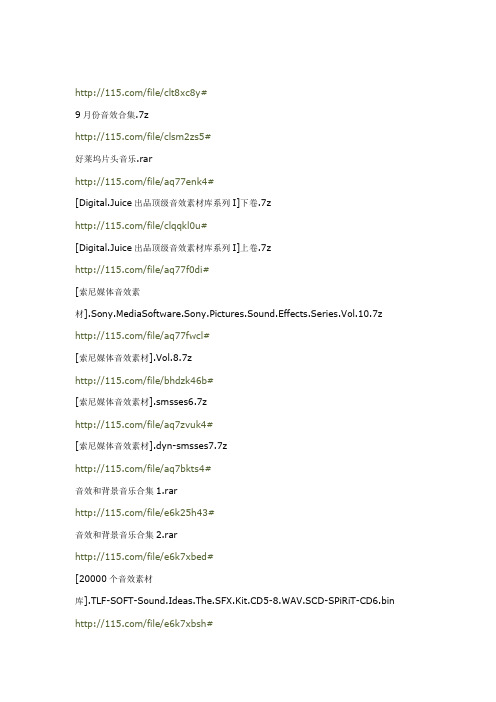
/file/clt8xc8y#9月份音效合集.7z/file/clsm2zs5#好莱坞片头音乐.rar/file/aq77enk4#[Digital.Juice出品顶级音效素材库系列I]下卷.7z/file/clqqkl0u#[Digital.Juice出品顶级音效素材库系列I]上卷.7z/file/aq77f0di#[索尼媒体音效素材].Sony.MediaSoftware.Sony.Pictures.Sound.Effects.Series.Vol.10.7z /file/aq77fwcl#[索尼媒体音效素材].Vol.8.7z/file/bhdzk46b#[索尼媒体音效素材].smsses6.7z/file/aq7zvuk4#[索尼媒体音效素材].dyn-smsses7.7z/file/aq7bkts4#音效和背景音乐合集1.rar/file/e6k25h43#音效和背景音乐合集2.rar/file/e6k7xbed#[20000个音效素材库].TLF-SOFT-Sound.Ideas.The.SFX.Kit.CD5-8.WAV.SCD-SPiRiT-CD6.bin /file/e6k7xbsh#[20000个音效素材库].TLF-SOFT-Sound.Ideas.The.SFX.Kit.CD1-4.WAV.SCD-SPiRiT-CD3.bin /file/clqz165w#[20000个音效素材库].TLF-SOFT-Sound.Ideas.The.SFX.Kit.CD5-8.WAV.SCD-SPiRiT-CD7.bin /file/e6ksa9kd#[20000个音效素材库].TLF-SOFT-Sound.Ideas.The.SFX.Kit.CD5-8.WAV.SCD-SPiRiT-CD5.bin /file/clqz1a85#[20000个音效素材库].TLF-SOFT-Sound.Ideas.The.SFX.Kit.CD5-8.WAV.SCD-SPiRiT-CD8.bin /file/e6ksa42k#[20000个音效素材库].TLF-SOFT-Sound.Ideas.The.SFX.Kit.CD1-4.WAV.SCD-SPiRiT-CD2.bin /file/bhdwkehj#[20000个音效素材库].TLF-SOFT-Sound.Ideas.The.SFX.Kit.CD1-4.WAV.SCD-SPiRiT-CD4.bin /file/clqz1hdb#[20000个音效素材库].TLF-SOFT-Sound.Ideas.The.SFX.Kit.CD1-4.WAV.SCD-SPiRiT-CD1.bin /file/aq7jw0if#新白娘子传奇法术音效.7z/file/aq7jhoxo#魔法少女奈叶_魔导器音效.rar/file/dnhix8ww#好莱坞电视广告专题片配乐系列.7z/file/e6ksz5pg#天下2_BGM&环境音效.rar/file/clqzdgnw#音效包.rar/file/e6kszued#音效库.rar/file/clqzdnzb#神鬼世界音效&音乐.rar/file/e6kszcrk#[声音素材].soundEffect.rar/file/clqzdey7#Lamento人声+音效.7z/file/dnhixdfy#[索尼媒体音效素材].Sony.MediaSoftware.Sony.Pictures.Sound.Effects.Series.Vol.9.rar /file/bhdlgnfj#日本音效辞典5CD.cd5游戏、荆棘特效篇.rar/file/aq79urm6#日本音效辞典5CD动画、cd1游戏特效篇.rar/file/clq435eb#日本音效辞典5CD.cd4动作音效篇.rar/file/clq43azq#日本音效辞典5CD.cd2情绪表达篇.rar/file/bhdlgeqj#2000个音效.rar/file/e6kft7h0#剑侠三_音效.7z/file/bhdlg6i6#音效素材库.zip/file/aq79ud5l#游魂Kiss_on_my_Deity背景音效.7z/file/clq43r9q#月影传说_音效.7zBBC_Sound_Effects_Library_(Hi_Quality_FLAC_format)..torrent 英国广播公司音效库全集(影视级片头音效)文件大小:20GB 共60张CD游戏原声【仙剑奇侠传系列】/folder/f38c20e2326#【分集】《仙剑奇侠传95DOS版》/file/aq3ins33《仙剑奇侠传98柔情版原声碟》/file/clnu2paa《仙剑奇侠传2-深冬的温柔音乐精选辑》/file/clnu2rpp《仙剑奇侠传三原声碟》/file/e6u3735v《仙剑奇侠传三未公开珍藏集》(随仙剑3外传发行)/file/e6u376n6《仙剑奇侠传三外传问情篇原声碟》/file/clnu22m4《仙剑奇侠传四原声碟》/file/clnu227j《仙剑奇侠传永恒回忆录原曲配乐专辑》/file/dncdpw4c《仙剑奇侠传五台版典藏音乐集》/file/e6uo1uu8【轩辕剑系列】/folder/fc06z7q0【分集】轩辕剑黄金纪念版:/file/f9a819c8f6轩辕剑3云和山的彼端:/file/f93f65a795轩辕剑3外传天之痕:/file/f9888b1315轩辕剑4黑龙舞兮云飞扬:/file/f974884fb0轩辕剑4外传苍之涛:/file/f9dfd73f8c轩辕剑5一剑凌云山海情:/file/f9f7f2b6c6轩辕剑外传汉之云:/file/f9c87ccab8轩辕剑外传云之遥:/file/f977dd6350【三国志系列】/folder/f3897f10b11#【幻想三国志系列】/folder/fdoul3yu【古剑奇谭】/folder/f38b50913b0#【信长之野望系列】/folder/fbrd6k2i----------------------【新三国志姜维传】jianwei.SoundTrk.part1.rar/file/c42sqjh7#jianwei.SoundTrk.part2.rar/file/c42sq7tu#jianwei.SoundTrk.part3.rar/file/a9nk7am7#jianwei.SoundTrk.part4.rar/file/ef75km1h#【最终幻想系列】最终幻想1-13无损音乐合集——来自:天使动漫/file/aq7s90b9/file/e6kqfjie/file/clq945xn/file/e6kqf9g8/file/bhdplvd2/file/aq7s98cu/file/clq94irt/file/e6kqf0z1/file/dnhql49n/file/bhdpla1l/file/clq94nlj/file/bhdplzl5/file/clq94gja/file/dnhqlhc7/file/e6kqf54t/file/e6kqfvqv/file/e6kqfvp1/file/aq7s96r9【战国无双】PS2战国无双1官方原声集/file/dnao8xi8PS2战国无双2官方原声集/file/dnao8x86WII战国无双3官方原声集/file/dnao8lfx-----------------【逆转裁判】【逆转裁判原声音乐】FLAC + BK:/file/c2b64bwo# MP3+ BK:/file/dpyuq03i# AAC+ BK:/file/dpyulxex#【逆转裁判2 原声音乐】FLAC + BK:/file/e7hxklsy# MP3+ BK:/file/c2b6qx1e# AAC+ BK:/file/an4r792j#【逆转裁判3 原声音乐】FLAC + BK:/file/be4axjj1# MP3+ BK:/file/an4bdwfn# AAC+ BK:/file/be4axeb0#【逆转裁判4 原声音乐】FLAC + BK:/file/bhy2crfw# MP3+ BK:/file/e6eb8gbc# AAC+ BK:/file/aqvm0x0a#【复苏的逆转原声音乐】FLAC + BK:/file/e6e03k5j# MP3+ BK:/file/dn34d1uf# AAC+ BK:/file/aqv2i2vp#【逆转检事原声音乐】FLAC + BK:/file/dpy11e88# MP3+ BK:/file/e7hkfyxj# AAC+ BK:/file/c2bss6ie#【逆转检事2 原声音乐】FLAC + BK:/file/be4iixne# MP3+ BK:/file/an4798va# AAC+ BK:/file/be4dlbce#【逆转裁判附赠音乐】FLAC + BK:/file/e6mp99qy# MP3+ BK:/file/clf05c6d# AAC+ BK:/file/dneotbla#【复苏的逆转特典音乐】FLAC + BK:/file/dpyuxl8f# MP3+ BK:/file/an4rh9jc# AAC+ BK:/file/an4rhtnz#【逆转检事特典逆转的旋律】FLAC + BK:/file/cljpe1q2# MP3+ BK:/file/e6ebjtzy# AAC+ BK:/file/dn37k679#【逆转检事2特典奏响逆转】FLAC + BK:/file/e6e04xcy# MP3+ BK:/file/bhybccfw# AAC+ BK:/file/cljw89rr#【逆转裁判交响乐】FLAC + BK:/file/be4rh141# MP3+ BK:/file/an45q7ch# AAC+ BK:/file/c2b0lggr#【逆转裁判爵士乐】FLAC + BK:/file/aq15lkch# MP3+ BK:/file/e6mp9vbr# AAC+ BK:/file/dneoth6f#【特别法庭2008 交响音乐会】FLAC + BK:/file/bhy2opim# MP3+ BK:/file/bhy2ocg0# AAC+ BK:/file/e6eb9wec#【幽灵诡计原声音乐】FLAC + BK:/file/cljwexpo#MP3+ BK:/file/aqv2cxdh#AAC+ BK:/file/aqv2ctxc#逆转裁判电子乐/file/dnr2m9zx#特别法庭2008 开催纪念品/file/dn34vmgp#特别法庭2008 开催纪念品秋/file/cljwa1sr#逆转裁判特别法庭2008春季交响音乐会视频(分辨率一般,中文字幕)/file/aqznbadz#【大神】大神OST音乐集/folder/fc3uzq4u#大神伝~小さき太阳/file/ew1i6bgf大神与七个伙伴OST原声集/file/eno0zvy3大神传名曲集/file/dnmqausd【天堂2】原声大碟.-.[Lineage.2].专辑.(mp3)【sky200700】/file/be4nvgkw#天堂2咒语/file/ajqenmhj【天地劫系列】天地劫序传-幽城幻剑录音乐CD千阙幻渺/file/clv24zm5#天地劫序传-幽城幻剑录音乐CD千阙幻渺/file/e627wpyh#【新剑侠情缘】新剑侠情缘/file/e7h7ge7n#剑侠情缘2/file/e7h7ge7n月影传说/file/be4jnw83--------------【真三国无双】/file/es9vjwnn【神鬼世界】/file/at2u84xv【八仙过海ol】/file/cmcc4e2e【赤壁OL】/file/b78g89am【诺亚传说OL】/file/clv3b4r7【镜花缘OL】/file/clglnz8z【无双OL】/file/dyv7ug2k【任天堂红白机】/file/aombiwl【FC.md.街机游戏音乐】/file/bh1ig9n9【跑跑卡丁车】/file/bhh0d1sj动漫原声【名侦探柯南OST全集】TVアニメ『名探侦コナン』OP33テーマ「Miss Mystery」/BREAKERZ /file/ehnp7cnhCONAN MOVIE 1 時計じかけの摩天楼OST/file/dyvzkowgCONAN MOVIE 214番目の標的OST/file/b4epthyqCONAN MOVIE 3世紀末の魔術師OST/file/b49weqjsCONAN MOVIE 4瞳の中の暗殺者OST/file/b4ewq5eoCONAN MOVIE 5天国へのカウントダウンOSTCONAN MOVIE 6ベイカー街の亡霊OST/file/a4ql0ylf名侦探柯南剧场版7弹~迷宫的十字路口原声集/file/e8hhexvCONAN MOVIE 8 銀翼の奇術師OST/file/a4nso822CONAN MOVIE 9 水平線上の陰謀OST/file/cbksrod5名侦探柯南剧场版10弹~侦探们的镇魂歌原声集/file/cuq4q0nn名侦探柯南剧场版11弹~蔚蓝的灵柩原声集/file/b6dlde7lCONAN MOVIE 12 戦慄の楽譜OST/file/eh6vthrkCONAN MOVIE 13 漆黒の追跡者OST/file/cb2z7t3x名侦探柯南剧场版_沉默的15分钟_OST(320K)/file/bh5i8lyh【犬夜叉】犬夜叉OST/file/bhznehms思维の境(think3.co)_犬夜叉_OST1/file/b3rung1l思维の境(think3.co)_犬夜叉_OST2/file/d2oejo9n思维の境(think3.co)_犬夜叉_OST3/file/at518zym思维の境(think3.co)_犬夜叉_蒼き野生を抱いて/file/d213pg6j犬夜叉剧场版音乐选集.-.[Inuyasha][Movie.OST.Best.Album-音楽撰集(映画篇)].专辑.(FLAC) /file/bhy8x84a【高达系列】高达W系列OVA/file/e6u3fqnd/file/aq3i9ieo高达0079OP吉他版/file/e6y6wl9t高达X原声套装1-3全/file/dncljofw/file/aq39z1f7/file/dncl6ert高达Z剧场版原声曲集/file/dnarvjnt高达30周年各种翻唱曲目/file/aq397srf高达30周年纪念145首原声集(全)/file/dncpds65/file/aq3ni7yi/file/bh5e603b/file/aq3nizm7/file/bh5e65ct/file/dncpd0zg/file/dncpd1jy/file/bh5e6qas/file/dncpd6mt/file/bh5e60uj【空之轨迹&零之轨迹】空之轨迹OST/file/bhiz9944空之轨迹FC/file/dn1gbrdd/file/dn16buch空之轨迹3rdDisc1:/file/bhiz9nco Disc2:/file/e65y49sl零の轨迹的音乐集分卷1:/file/clyw09qb 分卷2:/file/bhtbr33j【火影忍者】火影忍者原声大碟/file/c0jgori火影忍者疾风传原声集/file/clqk52r8火影忍者_龙刃记_OST/file/aqys2bv8火影忍者疾风传剧场版-血色监狱OST/file/e6msanlm火影忍者剧场版OST火の意志を継ぐ者/file/e6u6wmn3火影忍者剧场版-失落之塔/file/czg2gcbf火影忍者:龙刃记自导/file/e6kjewuw火影忍者剧场版1-雪姬忍法帖原声集/file/e9ck5a4火影忍者疾风传剧场版-羁绊原声集/file/c5ii54m【棋魂】棋魂原声集I/file/bht52mcc棋魂原声集II/file/dnrc74g3原声大碟.-.[Best.Of.Hikaru.No.Go棋魂主題曲全集] /file/aqk62ze7思维の境(think3.co)_棋魂_OST1/file/ewpm10yf思维の境(think3.co)_棋魂_OST2/file/b3run1kh思维の境(think3.co)_棋魂_OP/file/ewpm128e【死神】死神原声集死神原声集2/file/a98il7ns死神原声集.-.[BLEACH][TV.Original.Soundtrack.4][鷺巣诗郎].专辑.(FLAC) /file/es0wxivw死神原声ost替换龙之谷BGM/file/e6ukqsdr《死神BLEACH_剧场版4_地狱篇》OST/file/a9gvhfv5死神剧场版三.-.Fade.to.Black.呼唤你的名字原声集/file/aqvb577d神剧场版二原声集/file/bhk7liw1死神_OP_ED_原声合集/file/dn3k36of原声大碟.-.[死神主题曲精选.-.Bleach.The.Best]/file/bln2dpq3【家庭教师】家庭教师REBORN原声集1/file/bht17vq3家庭教师REBORN原声集2/file/cm4znync家庭教师REBORN原声集3/file/b3lwhxyl家庭教师REBORN原声集4/file/bht171ea思维の境(think3.co)_家庭教师ヒットマンREBORN!_标的1/file/b3iu8c9h思维の境(think3.co)_家庭教师ヒットマンREBORN!_标的2/file/ew5mha2t思维の境(think3.co)_家庭教师ヒットマンREBORN!_标的3/file/bhdlts3f思维の境(think3.co)_家庭教师ヒットマンREBORN!_角色歌_简介篇/file/clq4yryn思维の境(think3.co)_家庭教师ヒットマンREBORN!_角色歌_第一弹/file/d21836mc思维の境(think3.co)_家庭教师ヒットマンREBORN!_角色歌_第二弹/file/b3ikoe0h思维の境(think3.co)_家庭教师ヒットマンREBORN!_角色歌_第三弹/file/at1q9lk8思维の境(think3.co)_家庭教师ヒットマンREBORN!_角色歌_第四弹思维の境(think3.co)_家庭教师ヒットマンREBORN!_角色歌_第五弹/file/bhdlt7o2【妖精的尾巴】妖精的尾巴原声集VOL.1/file/enn4nw64妖精的尾巴原声集VOL.2/file/enn4257w妖精的尾巴原声集.-.[FAIRY.TAIL][TVA.OST3][高梨康治].专辑.(MP3) /file/aq37p5hu【银魂】银魂原声集.-.[Gintama][TV.OST1-3].专辑/file/bhuhn8gu银魂OST_新译红樱篇/file/dn96d2tj银魂剧场版-银魂新訳红桜篇原声集/file/b7t49wvt【海贼王】海贼王ost/file/aqkn1ljk海贼王10周年纪念33首全原声集2CD/file/b3olsloo【百变小樱魔卡少女】百变小樱OST1/file/eflmmohc百变小樱OST2/file/eflmmn7a百变小樱OST3/file/dl5eekji百变小樱OST4/file/eflmm0lr百变小樱OST(剧场版)魔卡少女樱剧场版封印的卡片OST/file/c4xffqoe库洛魔法使声优歌絵卷/file/c4xf7k0r【美少女战士】美少女战士音乐合集./file/clyqal5x美少女战士真人版].Sailor.Moon.OST/file/anhvfagy【未来日记】未来日记漫画/file/aq6mwnrf未来日记OP、ED/file/aq6mwqke/file/dng7bzo4------------【交响诗篇】交响诗篇TV&OVA原声曲集/file/cl3iqgiw交响诗篇エウレカセブン_ORIGINAL_SOUNDTRACK1/file/dnmahsdd剧场版交响诗篇エウレカセブンポケットが虹でいっぱいMUSIC COLLECTION /file/aquyima6/file/e6tv3oc0/file/cl3tupbb【钢之炼金术师】钢之炼金术师OP+ED+OST/file/cb0dfkpl钢之炼金术师剧场版叹息之丘的神圣之星原声集/file/c29zlzym钢之炼金术师FA主题曲集/file/cbscfm0l【寒蝉鸣泣之时】寒蝉鸣泣之时OST/file/clv6th56寒蝉鸣泣之时·祭原声碟/file/cmkxb471寒蝉鸣泣之时·解声乐集1/file/ewilw0m7寒蝉鸣泣之时·解声乐集2/file/atejx5fh【叛逆的鲁鲁修】叛逆的鲁路修原声集1/file/d2wr2dfq叛逆的鲁路修原声集2/file/cmkymey0鲁鲁修的原声曲集第一部分/file/dnclhlvy鲁鲁修的原声曲集第二部分/file/bh5ldwpq【宠物小精灵】(来自:天使动漫)CD1(MP3):/file/bhiubl20CD1(FLAC):/file/aqy4tzer#CD2(mp3):/file/aqk12tchCD2(FLAC):/file/dn0y2h5z#宠物小精灵剧场版OST/file/clq16e3b【猫眼三姐妹】猫眼三姐妹原声音乐集.-.[Cat__s.Eye][TV.OST.I].专辑.(MP3).rar/file/e7hx7rnn#猫眼三姐妹原声音乐集.-.[Cat__s.Eye][TV.OST.II].专辑.(MP3).rar/file/an4lxpsr#【无皇刃谭原声音乐集】异邦人:无皇刃谭原声音乐集.-.[Sword.of.the.stranger][Movie.OST].专辑.(TTA) /file/f672ad0f12异邦人:无皇刃谭原声音乐集.-.[Sword.of.the.stranger][Movie.OST].专辑.(MP3) /file/f629253672【小小手心原声集(无损)】part1:/file/f49a8f6335part2:/file/f4324241b【翼神传说】翼神传说123+多元变奏曲整合/file/dnamj41g/file/dnamjsu4【圣斗士星矢】圣斗士星矢.天界编.序奏/file/a4ki8dda圣斗士星矢冥王神话主題歌集/file/dnhd9xxm圣斗士星矢冥王神话原声集【真盖塔·世界最后之日】OST1:/file/dn8ymyrrOST2:/file/bhk4g3dd【无法逃离的背叛】无法挣脱的背叛OST1/file/a46rocbm 无法逃离的背叛OST2/file/enkl84xp 【第七龙神】第七龙神2020OST/file/aqo2ve9y 第七龙神2020限量原声/file/dnr41f63【数码宝贝】数码宝贝OST/file/clc864eq数码宝贝1代至5代OST /file/b3ow62tn【未来都市】未来都市OST1/file/cljoci2g#未来都市OST2/file/bht05mvm#------------------福星小子原声音乐盒/file/b4q0dmgt潘多拉之心OST/file/a3qhm2z信蜂OST/file/ehie3ds8南极大陆OST/file/bhrhmexn蜜之味~蜂蜜的味道~OST /file/dnonhmkj哆啦A梦OST/file/cbhvtwrn驱魔少年OST/file/aq3zk20l夏目友人帳OST/file/bhbfbb8eAIR剧场版ost/file/czbnkmlsTaiyouWaShizumanaiOST /file/c452yl4e借东西的小人阿莉埃蒂OST /file/dnsstpmz白兔糖OST/file/dn1a7jgb妖怪人間OST/file/e6aj2zq7Each Step EscapeOST/file/dngqnkmd东京地震8.0原声集/file/a2rjd9d天鹅绒金矿OST/file/e62trtzb荒川爆笑团原声集/file/bw8z6fx6咎狗の血OST/file/b4dt0s1q虫师OST/file/ew16kslj流星の絆OST/file/dl597ucz第3次超级机器人大战α银河的尽头原声曲集/file/dn4alypwEVA TV版的原声曲集/file/bh5ldsij神知原声曲集/file/dnsjy1s5哀战士原声曲集/file/dnclhfgt重力战线原声集/file/dnam4w9w天元突破原声集/file/clwfwydx兽装机攻断空我NOVA的主题曲收录/file/bhd7a64tTVアニメ「罪恶王冠」OST原声集/file/aqua1z23#OVA寒蝉鸣泣之时煌file.04 完全生产限定版特典CD「マジカルディスク」/堀江由衣/file/dpx2dran#源氏物语千年纪.Genji原声集/file/dpyq4ztq初音未来:歌姬计划扩展版歌曲集/file/clywy7i7水树奈々-理想论/file/bhr7rmmj#CRヱヴァンゲリヲン』7thテーマソング(CV.宮村優子)/file/cl3i1unp#EXIT_TUNES_PRESENTS_THE_BEST_OF_otetsu/otetsu_feat/file/e6tranjt#TVアニメ「HUNTER×HUNTER」ED/file/aq5xhl58#TVアニメ「FAIRY_TAIL」OP10テーマ「I_Wish」/Milky_Bunny/file/e6ti6b46#花牌情缘OST&角色歌集/file/e6ty1sih剧场版轻音少女剧中歌放课后ティータイムin MOVIE/file/e7lwly1xTVアニメ「C3魔方少女角色歌集」/file/dnmmgo8n#異国迷路のクロワーゼ_The_Animation_第5巻_特典CD_アソートCD4[320K]/file/be33feyx---------------东方project全官方CD(来自百度东方project吧)旧作游戏音乐CD幺乐团之历史是由5个专辑组成的旧PC-98东方游戏原声曲。
李阳疯狂英语全套mp3下载链接

李阳疯狂英语全套mp3下载链接ftp://218.195.64.31/李阳疯狂英语/学习秘诀视频演讲(李阳)/英语学习的秘诀01(李阳).rm ftp://218.195.64.31/李阳疯狂英语/学习秘诀视频演讲(李阳)/英语学习的秘诀02(李阳).rm ftp://218.195.64.31/李阳疯狂英语/学习秘诀视频演讲(李阳)/英语学习的秘诀03(李阳).rm ftp://218.195.64.31/李阳疯狂英语/学习秘诀视频演讲(李阳)/英语学习的秘诀04(李阳).rm ftp://218.195.64.31/李阳疯狂英语/学习秘诀视频演讲(李阳)/英语学习的秘诀05(李阳).rm ftp://218.195.64.31/李阳疯狂英语/学习秘诀视频演讲(李阳)/英语学习的秘诀06(李阳).rmftp://218.195.64.31/李阳疯狂英语/李阳疯狂英语全套/100个发音秘决/100.chmftp://218.195.64.31/李阳疯狂英语/李阳疯狂英语全套/100个发音秘决/1a.mp3ftp://218.195.64.31/李阳疯狂英语/李阳疯狂英语全套/100个发音秘决/1b.mp3ftp://218.195.64.31/李阳疯狂英语/李阳疯狂英语全套/100个发音秘决/2a.mp3ftp://218.195.64.31/李阳疯狂英语/李阳疯狂英语全套/100个发音秘决/2b.mp3ftp://218.195.64.31/李阳疯狂英语/李阳疯狂英语全套/疯狂cet4快速突破/a1.mp3ftp://218.195.64.31/李阳疯狂英语/李阳疯狂英语全套/疯狂cet4快速突破/a2.mp3ftp://218.195.64.31/李阳疯狂英语/李阳疯狂英语全套/疯狂cet4快速突破/b1.wmaftp://218.195.64.31/李阳疯狂英语/李阳疯狂英语全套/疯狂cet4快速突破/b2.wmaftp://218.195.64.31/李阳疯狂英语/李阳疯狂英语全套/疯狂cet4快速突破/c1.wmaftp://218.195.64.31/李阳疯狂英语/李阳疯狂英语全套/疯狂cet4快速突破/c2.wmaftp://218.195.64.31/李阳疯狂英语/李阳疯狂英语全套/疯狂英语句子速成/jzsc1A.mp3ftp://218.195.64.31/李阳疯狂英语/李阳疯狂英语全套/疯狂英语句子速成/jzsc1B.mp3ftp://218.195.64.31/李阳疯狂英语/李阳疯狂英语全套/疯狂英语句子速成/jzsc2A.mp3ftp://218.195.64.31/李阳疯狂英语/李阳疯狂英语全套/疯狂英语句子速成/jzsc2B.mp3ftp://218.195.64.31/李阳疯狂英语/李阳疯狂英语全套/疯狂英语口语速成/crazy-aural-1.MP3 ftp://218.195.64.31/李阳疯狂英语/李阳疯狂英语全套/疯狂英语口语速成/crazy-aural-2.MP3 ftp://218.195.64.31/李阳疯狂英语/李阳疯狂英语全套/疯狂英语口语速成/crazy-aural-3.MP3 ftp://218.195.64.31/李阳疯狂英语/李阳疯狂英语全套/疯狂英语口语速成/crazy-aural-4.MP3 ftp://218.195.64.31/李阳疯狂英语/李阳疯狂英语全套/疯狂英语口语速成/crazy-oral-A.MP3 ftp://218.195.64.31/李阳疯狂英语/李阳疯狂英语全套/疯狂英语口语速成/crazy-oral-B.MP3 ftp://218.195.64.31/李阳疯狂英语/李阳疯狂英语全套/疯狂英语口语速成/crazy-oral-C.MP3 ftp://218.195.64.31/李阳疯狂英语/李阳疯狂英语全套/疯狂英语口语速成/crazy-oral-D.MP3 ftp://218.195.64.31/李阳疯狂英语/李阳疯狂英语全套/疯狂英语口语速成/kysc1A.mp3 ftp://218.195.64.31/李阳疯狂英语/李阳疯狂英语全套/疯狂英语口语速成/kysc1B.mp3 ftp://218.195.64.31/李阳疯狂英语/李阳疯狂英语全套/疯狂英语口语速成/kysc2A.mp3ftp://218.195.64.31/李阳疯狂英语/李阳疯狂英语全套/疯狂英语突破单词/tpdc1A.mp3 ftp://218.195.64.31/李阳疯狂英语/李阳疯狂英语全套/疯狂英语突破单词/tpdc1B.mp3 ftp://218.195.64.31/李阳疯狂英语/李阳疯狂英语全套/疯狂英语突破单词/tpdc2A.mp3 ftp://218.195.64.31/李阳疯狂英语/李阳疯狂英语全套/疯狂英语突破单词/tpdc2B.mp3 ftp://218.195.64.31/李阳疯狂英语/李阳疯狂英语全套/疯狂英语突破单词/tpdc3A.mp3 ftp://218.195.64.31/李阳疯狂英语/李阳疯狂英语全套/疯狂英语突破单词/tpdc3B.mp3 ftp://218.195.64.31/李阳疯狂英语/李阳疯狂英语全套/疯狂英语突破单词/tpdc4A.mp3 ftp://218.195.64.31/李阳疯狂英语/李阳疯狂英语全套/疯狂英语突破单词/tpdc4B.mp3ftp://218.195.64.31/李阳疯狂英语/李阳疯狂英语全套/疯狂英语突破对话/tpdh1A.mp3 ftp://218.195.64.31/李阳疯狂英语/李阳疯狂英语全套/疯狂英语突破对话/tpdh1B.mp3 ftp://218.195.64.31/李阳疯狂英语/李阳疯狂英语全套/疯狂英语突破对话/tpdh2A.mp3 ftp://218.195.64.31/李阳疯狂英语/李阳疯狂英语全套/疯狂英语突破对话/tpdh2B.mp3 ftp://218.195.64.31/李阳疯狂英语/李阳疯狂英语全套/疯狂英语突破对话/tpdh3A.mp3 ftp://218.195.64.31/李阳疯狂英语/李阳疯狂英语全套/疯狂英语突破对话/tpdh3B.mp3ftp://218.195.64.31/李阳疯狂英语/李阳疯狂英语全套/疯狂英语突破功能/tpgn1A.mp3 ftp://218.195.64.31/李阳疯狂英语/李阳疯狂英语全套/疯狂英语突破功能/tpgn1B.mp3 ftp://218.195.64.31/李阳疯狂英语/李阳疯狂英语全套/疯狂英语突破功能/tpgn2A.mp3 ftp://218.195.64.31/李阳疯狂英语/李阳疯狂英语全套/疯狂英语突破功能/tpgn2B.mp3 ftp://218.195.64.31/李阳疯狂英语/李阳疯狂英语全套/疯狂英语突破功能/tpgn3A.mp3 ftp://218.195.64.31/李阳疯狂英语/李阳疯狂英语全套/疯狂英语突破功能/tpgn3B.mp3ftp://218.195.64.31/李阳疯狂英语/李阳疯狂英语全套/疯狂英语突破句型/tpjx1A.mp3 ftp://218.195.64.31/李阳疯狂英语/李阳疯狂英语全套/疯狂英语突破句型/tpjx1B.mp3 ftp://218.195.64.31/李阳疯狂英语/李阳疯狂英语全套/疯狂英语突破句型/tpjx2A.mp3 ftp://218.195.64.31/李阳疯狂英语/李阳疯狂英语全套/疯狂英语突破句型/tpjx2B.mp3 ftp://218.195.64.31/李阳疯狂英语/李阳疯狂英语全套/疯狂英语突破句型/tpjx3A.mp3 ftp://218.195.64.31/李阳疯狂英语/李阳疯狂英语全套/疯狂英语突破句型/tpjx3B.mp3ftp://218.195.64.31/李阳疯狂英语/李阳疯狂英语全套/疯狂英语突破口语/tpky1A.mp3 ftp://218.195.64.31/李阳疯狂英语/李阳疯狂英语全套/疯狂英语突破口语/tpky1B.mp3 ftp://218.195.64.31/李阳疯狂英语/李阳疯狂英语全套/疯狂英语突破口语/tpky2A.mp3 ftp://218.195.64.31/李阳疯狂英语/李阳疯狂英语全套/疯狂英语突破口语/tpky2B.mp3 ftp://218.195.64.31/李阳疯狂英语/李阳疯狂英语全套/疯狂英语突破口语/tpky3A.mp3 ftp://218.195.64.31/李阳疯狂英语/李阳疯狂英语全套/疯狂英语突破口语/tpky3B.mp3 ftp://218.195.64.31/李阳疯狂英语/李阳疯狂英语全套/疯狂英语突破语法/tpyf1A.mp3ftp://218.195.64.31/李阳疯狂英语/李阳疯狂英语全套/疯狂英语突破语法/tpyf2A.mp3ftp://218.195.64.31/李阳疯狂英语/李阳疯狂英语全套/疯狂英语突破语法/tpyf2B.mp3ftp://218.195.64.31/李阳疯狂英语/李阳疯狂英语全套/疯狂英语突破语法/tpyf3A.mp3ftp://218.195.64.31/李阳疯狂英语/李阳疯狂英语全套/疯狂英语突破语法/tpyf3B.mp3ftp://218.195.64.31/李阳疯狂英语/李阳疯狂英语全套/疯狂英语音标速成/ybsc1A.mp3ftp://218.195.64.31/李阳疯狂英语/李阳疯狂英语全套/疯狂英语音标速成/ybsc1B.mp3ftp://218.195.64.31/李阳疯狂英语/李阳疯狂英语全套/疯狂英语音标速成/ybsc2A.mp3ftp://218.195.64.31/李阳疯狂英语/李阳疯狂英语全套/疯狂英语音标速成/ybsc2B.mp3ftp://218.195.64.31/李阳疯狂英语/李阳疯狂英语全套/李阳-克立兹/李阳疯狂英语口语和听力四本书的MP3/crazy-aural-1.MP3ftp://218.195.64.31/李阳疯狂英语/李阳疯狂英语全套/李阳-克立兹/李阳疯狂英语口语和听力四本书的MP3/crazy-aural-2.MP3ftp://218.195.64.31/李阳疯狂英语/李阳疯狂英语全套/李阳-克立兹/李阳疯狂英语口语和听力四本书的MP3/crazy-aural-3.MP3ftp://218.195.64.31/李阳疯狂英语/李阳疯狂英语全套/李阳-克立兹/李阳疯狂英语口语和听力四本书的MP3/crazy-aural-4.MP3ftp://218.195.64.31/李阳疯狂英语/李阳疯狂英语全套/李阳-克立兹/李阳疯狂英语口语和听力四本书的MP3/crazy-oral-A.MP3ftp://218.195.64.31/李阳疯狂英语/李阳疯狂英语全套/李阳-克立兹/李阳疯狂英语口语和听力四本书的MP3/crazy-oral-B.MP3ftp://218.195.64.31/李阳疯狂英语/李阳疯狂英语全套/李阳-克立兹/李阳疯狂英语口语和听力四本书的MP3/crazy-oral-C.MP3ftp://218.195.64.31/李阳疯狂英语/李阳疯狂英语全套/李阳-克立兹/李阳疯狂英语口语和听力四本书的MP3/crazy-oral-D.MP3。
英文歌曲,学好口语的一大法宝
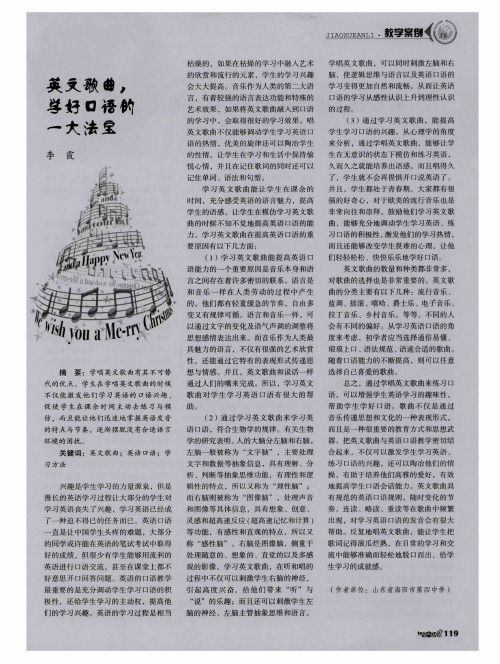
代的优 点。学生在 学唱英文歌 曲的时候 不仅 能激 发他 们 学 习英 语的 口语 兴趣 ,
促使 学 生在课 余 时 间主 动 去 练 习与模
帮助 学 生学 好 口语。歌 曲不仅 是通 过
仿 ,而且 能让他们迅速地 掌握英语发 音
的特点 与节奏 ,逐渐摆 脱没有合适语 言
环 境 的 困扰 。
( 2)通过 学 习英文 歌 曲来学 习英 语 口语 ,符 合生物学 的规 律。有关生物
学的研究表 明, 人 的大脑分左脑 和右脑 , 左脑一般被 称为 “ 文字脑 ” ,主要 处理
音乐传递思想和文化 的一种 表现形式 , 而且是一种很重要 的教育方 式和思想武
们轻轻松松 、快快乐乐地学好 口语。 英 文歌曲的数量和种类都非常多 ,
对歌 曲的选择也 是非常重要的 。英文歌 曲的分类 主要有 以下几种 :流行音乐 、
的 ,他 们都有轻重缓 急的节奏 . 自由多
变 又有 规律可循 。语 言和音乐一样 ,可
蓝调 、摇滚 、嘻哈 、爵士乐 、电子音乐 、 拉丁音乐 、乡村音 乐 ,等等。不同 的人
辑 性 的特 点 ,所 以又 称 为 “ 理 性脑” ;
兴 趣 是 学 生 学 习 的力 量 源 泉 ,但 是
漫 长的英语学 习过程 让大部分 的学 生对 学 习英 语丧失 了兴趣 .学 习英语 已经成 了一种 迫不得 已的任 务而 已。英语 口语
一
而右脑则被 称为 “ 图像脑 ” ,处理声音 和图像等具 体信息 ,具有想 象 、创意 、 灵感和超高速反应 ( 超 高速记忆 和计算 )
了,学生就不会再 畏惧开 口说英语 了。 并且 ,学生都 处于青春期 ,大家都有很
日常英语单词大全记忆(口语)
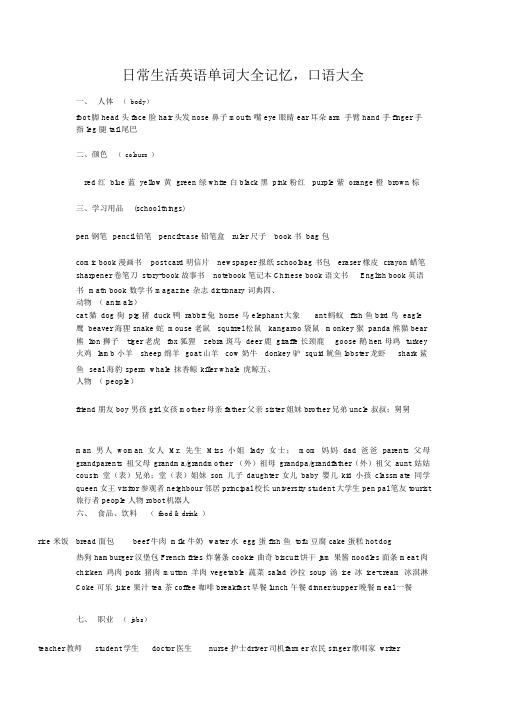
日常生活英语单词大全记忆,口语大全一、人体(body)foot 脚 head 头 face 脸 hair 头发 nose 鼻子 mouth 嘴 eye 眼睛 ear 耳朵 arm 手臂 hand 手 finger 手指 leg 腿 tail 尾巴二、颜色(colours)red 红 blue 蓝 yellow 黄 green 绿 white 白 black 黑 pink 粉红purple 紫 orange 橙 brown 棕三、学习用品(school things)pen 钢笔pencil 铅笔pencil-case 铅笔盒ruler 尺子book 书 bag 包comic book 漫画书post card 明信片newspaper 报纸 schoolbag 书包eraser 橡皮crayon 蜡笔sharpener 卷笔刀 story-book 故事书notebook 笔记本 Chinese book 语文书English book 英语书math book 数学书 magazine 杂志 dictionary 词典四、动物( animals)cat 猫 dog 狗 pig 猪 duck 鸭 rabbit 兔 horse 马 elephant 大象ant 蚂蚁fish 鱼 bird 鸟 eagle鹰 beaver 海狸 snake 蛇 mouse 老鼠squirrel 松鼠kangaroo 袋鼠monkey 猴 panda 熊猫 bear熊 lion 狮子tiger 老虎fox 狐狸zebra 斑马 deer 鹿 giraffe 长颈鹿goose 鹅 hen 母鸡turkey火鸡lamb 小羊sheep 绵羊goat 山羊cow 奶牛donkey 驴 squid 鱿鱼 lobster 龙虾shark 鲨鱼seal 海豹 sperm whale 抹香鲸 killer whale 虎鲸五、人物( people)friend 朋友 boy 男孩 girl 女孩 mother 母亲 father 父亲 sister 姐妹 brother 兄弟 uncle 叔叔;舅舅man 男人woman 女人Mr. 先生Miss 小姐lady 女士;mom 妈妈dad 爸爸parents 父母grandparents 祖父母grandma/grandmother (外)祖母grandpa/grandfather(外)祖父aunt 姑姑cousin 堂(表)兄弟;堂(表)姐妹son 儿子daughter 女儿baby 婴儿kid 小孩classmate 同学queen女王 visitor 参观者 neighbour 邻居 principal 校长 university student 大学生 pen pal 笔友 tourist 旅行者 people 人物 robot 机器人六、食品、饮料(food & drink)rice 米饭bread 面包beef 牛肉milk 牛奶water 水 egg 蛋 fish 鱼 tofu 豆腐 cake 蛋糕 hot dog 热狗 hamburger 汉堡包 French fries 炸薯条 cookie 曲奇 biscuit 饼干 jam 果酱 noodles 面条 meat 肉chicken 鸡肉pork 猪肉mutton 羊肉vegetable 蔬菜salad 沙拉soup 汤ice 冰ice-cream 冰淇淋Coke 可乐 juice 果汁 tea 茶 coffee 咖啡 breakfast 早餐 lunch 午餐 dinner/supper 晚餐 meal 一餐七、职业(jobs)teacher教师student 学生doctor 医生nurse护士d river 司机f armer 农民 singer 歌唱家writer作家actor 男演员actress 女演员artist 画家T V reporter 电视台记者engineer 工程师accountant 会计 policeman( 男 )警察 salesperson销售员 cleaner 清洁工 baseball player 棒球运动员 assistant 售货员 police 警察八、水果、蔬菜(fruit & vegetables)apple 苹果 banana 香蕉 pear 梨 orange 橙 watermelon 西瓜 grape 葡萄 eggplant 茄子 green beans 青豆 tomato 西红柿 potato 土豆 peach 桃 strawberry 草莓 cucumber 黄瓜 onion 洋葱 carrot 胡萝卜cabbage 卷心菜九、衣服(clothes)jacket 夹克衫 shirt 衬衫 T-shirt 丅恤衫 skirt 短裙子 dress 连衣裙 jeans 牛仔裤 pants 长裤 socks 袜子shoes鞋子 sweater毛衣 coat 上衣 raincoat 雨衣 shorts短裤 sneakers网球鞋 slippers 拖鞋 sandals 凉鞋 boots 靴子 hat(有沿的 )帽子 cap 便帽 sunglasses 太阳镜 tie 领带 scarf 围巾gloves 手套 trousers 裤子 cloth 布十、交通工具 (vehicles)bike 自行车jeep 吉普车bus 公共汽车van 小货车;train 火车boat 小船ship 轮船yacht 快艇 car 小汽车taxiplane/airplane 飞机subway / underground 地铁motor cycle出租车摩托车十一、杂物( other things )window 窗户door 门 desk 课桌chair 椅子bed 床 computer 计算机board 写字板fan 风扇light 灯 teacher's desk 讲台picture 图画;照片wall 墙壁floor 地板 curtain 窗帘trash bin 垃圾箱closet 壁橱mirror 镜子end table 床头柜 football/soccer 足球present 礼物walkman 随身听lamp 台灯phone 电话sofa 沙发shelf 书架fridge冰箱table 桌子TV电视air-conditioner 空调 key 钥匙 lock 锁 photo 照片 chart 图表 plate 盘子 knife 刀 fork 叉 spoon 勺子chopsticks 筷子 pot 锅 gift 礼物 toy 玩具 doll 洋娃娃 ball 球 balloon 气球 kite 风筝 jigsaw puzzle 拼图游戏 box 盒子 umbrella 伞 zipper 拉链 violin 小提琴 yo-yo 溜溜球 nest 鸟窝hole 洞 tube 管子 toothbrush 牙刷 menu 菜单 e-card 电子卡片 e-mail 电子邮件 traffic light 交通灯 money 钱 medicine 药十二、地点( locations )home 家 room 房间 bedroom 卧室 bathroom卫生间 living room 起居室kitchen 厨房classroom 教室 school 学校 park 公园 library 图书馆 post office 邮局 police office 警察局hospital 医院 cinema 电影院 bookstore 书店 farm 农场 zoo 动物园 garden 花园study 书房playground 操场 canteen 食堂 teacher's office教师办公室library 图书馆gym 体育馆washroom 卫生间 art room 绘画教室 computer room 计算机教室 music room 音乐教室 TV room 电视机房 flat公寓 company 公司 factory 工厂 fruit stand 水果摊 pet shop 宠物商店nature park 自然公园theme park 主题公园 science museum 科学博物馆 the Great Wall 长城supermarket 超市 bank 银行 country 国家 village 乡村 city 城市 hometown 家乡 bus stop 公交车站十三、课程( classes)sports 体育运动 science 科学 Moral Education 思想品德课 Social Studies 社会 Chinese 语文 math 数学 PE 体育课 English 英语课十四、气象( weather)cold 寒冷的 warm 温暖的 cool 凉爽的snowy 下雪的sunny 晴朗的hot 炎热的 rainy 下雨的 windy 有风的cloudy 多云的weather report 天气预报 rain 雨 cloud 云 sun 太阳 mountain 山 sky 天空 rainbow 彩虹 wind 风 air 空气 moon 月亮十五、国家、城市( countries & cities )China/PRC 中国 America/USA 美国 UK 联合王国 England 英国Canada/CAN 加拿大 Australia 澳大利亚New York 纽约 London 伦敦 Sydney 悉尼 Moscow 莫斯科 Cairo 开罗十六、景物( nature)river 河流lake 湖泊 stream 河溪 forest 森林 path 小道 road 公路house 房子bridge 桥 building 建筑物十七、植物( plants)flower 花 grass 草 tree 树 seed 种子sprout 苗 plant 植物rose 玫瑰leaf 叶子十八、星期( week)Monday 星期一 Tuesday 星期二 Wednesday 星期三 Thursday 星期四 Friday 星期五 Saturday 星期六 Sunday 星期天 weekend 周末十九、月份( months)Jan. (January)一月 Feb(. February)二月 Mar.(March) 三月 April 四月 May 五月 June六月 July 七月 Aug.(August) 八月 Sept.(September) 九月 Oct.(October) 十月 Nov.(November) 十一月Dec.(December) 十二月二十、季节( seasons)spring 春 summer 夏 fall/autumn 秋 winter 冬二十一、方位( directions )south 南 north 北 east 东 west 西 left 左边right 右边二十二、患病( illness)have a fever 发烧hurt 疼痛have a cold 感冒have a toothache 牙疼have a headache头疼have a sore throat 喉咙疼二十三、数词( numbers)1 one2 two3 three4 four5 five6 six7 seven8 eight9 nine 10 ten二十四、形容词(adj.)big 大的 small 小的 long 长的 tall 高的 short 短的;矮的 young 年轻的 old 旧的;老的 strong 健壮的thin 瘦的 active 积极活跃的 quiet 安静的 nice 好看的 kind 和蔼亲切的 strict 严格的smart 聪明的 funny 滑稽可笑的 tasty 好吃的 sweet 甜的 salty 咸的 sour 酸的 fresh 新鲜的 favourite 最喜爱的 clean 干净的 tired 疲劳的 excited 兴奋的 angry生气的 happy高兴的 bored无聊的 sad忧愁的 taller 更高的 shorter 更矮的 stronger 更强壮的 older 年龄更大的 younger 更年轻的 bigger 更大的 heavier 更重的 longer 更长的 thinner 更瘦的 smaller 更小的 good 好的 fine 好的great 很好的 heavy 重的 new 新的 fat 胖的 happy 快乐的 right 对的 hungry饥饿的 cute逗人喜爱的 little 小的 lovely可爱的beautiful 漂亮的 colourful 色彩鲜艳的pretty 漂亮的 cheap 便宜的 expensive 昂贵的juicy多汁的 tender 嫩的 healthy 健康的 ill 有病的 helpful有帮助的 high 高的 easy简单的proud 骄傲的 sick 有病的 better 更好的 higher 更高的二十五、介词( prep.)in 在⋯⋯里on 在⋯⋯上;在⋯⋯时候 under 在⋯⋯下面 near 在⋯⋯的旁边 behind 在⋯⋯后边 next to与⋯⋯相邻 over 在⋯⋯上面 in front of 在⋯⋯前面二十六、代词( pron.)I 我 we 我们you 你;你们 he 他 she 她 it 它 they 他(她,它)们 my 我的 our 我们的 your 你的;你们的his 他的 her 她的二十七、动词( v.)play(.ed)玩;踢 swim(swam) 游泳 skate 滑冰fly(flew) 飞 jump 跳 walk 走 run(run) 跑 climb爬 fight(fought)吃turn转弯打架swing(swung) 荡 eat(ate)吃buy(bought) 买take(took) 买;带sleep(slept)睡觉like 像,喜欢live居住teach( taught )教have(had)有;go(went) 去study(studied) 学习 learn 学习 sing(sang)唱歌 dance跳舞 row 划 do(did) 做 do homework 做作业 do housework 做家务 watch TV 看电视 read(read) books 读书 cook the meals 做饭 water the flowers 浇花 sweep(swept) the floor 扫地 clean the bedroom 打扫卧室 make(made) the bed 铺床 set(set) the table摆饭桌 wash the clothes 洗衣服 do the dishes 洗碗碟 use a computer使用计算机do morning exercises 晨练;做广播操e at breakfast 吃早饭eat dinner 吃晚饭 go to school 上学have English class 上英语课 play sports 进行体育运动get( got) up 起床 climb mountains 爬山 go shopping 买东西 play the piano 弹钢琴 visit grandparents 看望(外)祖父母go hiking去远足 fly kites 放风筝 make a snowman 堆雪人 plant trees 种树 draw(drew) pictures 画画cook dinner做饭 read a book 看书 answer the phone 接电话listen to music 听音乐 clean theroom 打扫房间 write(wrote) a letter 写信 write an e-mail 写电子邮件 drink(drank)water 喝水take pictures 照相 watch insects 观察昆虫 pick up leaves 采摘树叶 meet(met)见面welcome 欢迎 thank 谢谢 love 爱 work 工作 drink(drank) 喝 play computer games 玩电脑游戏play chess下棋 empty the trash 倒垃圾 do an experiment 做实验catch butterflies 捉蝴蝶 count insects 数昆虫 collect insects 收集昆虫 collect leaves 收集树叶write a report 写报告 play chess 下棋have a picnic 举行野餐 get to 到达 ride(rode) a bike 骑自行车play the violin拉小提琴 makekites 制作风筝 collect stamps 集邮 put away the clothes 收拾衣服 get off 下车take a trip 去旅行 read a magazine阅读杂志 go to the cinema 去看电影go straight 向前直走taste尝 smell 闻feed(fed)喂养shear 剪 milk 挤奶look 看 guess 猜 help 帮助 pass传递show 展示use 使用clean 打扫ride(rode) 骑open 打开close 关上put 放paint 绘画stop(stopped)停 wait 等 find(found) 寻找到tell(told) 告诉kick踢bounce反弹drive(drove) 驾驶fold 折 send(sent)寄wash 洗 shine 照耀 become 变成 feel(felt) 感觉到 think(thought) 思考 meet(met)遇见fall(fell) 落下 leave(left) 离开 wake(woke) up 醒来 put on 穿上 take off 脱掉 hang up 挂起 wear(wore) 穿 go home 回家 go to bed 上床睡觉二十八、音乐流派:Jazz:爵士,包括有 cool jazz, bebop, acid jazz, swing, fushion 等。
各种常用的背景音乐

各种常用的背景音乐有一种旋好象一见钟情的意中人,让你知道什么叫“曾经沧海难为水,除却巫山不是云”;有一种旋律好似相思成灾的恋人,让你体会什么叫“衣带渐宽终不悔,为伊消得人憔悴”;有一种旋律恰似相恨见晚的知音,让你感慨什么叫“此曲只应天上有,人间难得几回闻”。
没错,这就是背景音乐,真正的好音乐,传说中的“销魂曲”。
1.豪勇七蛟龙(The Magnificent Seven)大型颁奖晚会最喜欢用的背景音乐,地球人都知道。
伯恩斯坦作曲。
迅雷专用下载_/doc/66894997.html,/ly/mp3TV/12.mp3 /doc/66894997.html,/ly/mp3TV/12.mp32.故乡的原风景《神雕侠侣》多次引用,哀伤感人,出自日本作曲家宗次郎1991年的专辑《木道》。
迅雷专用下载_/doc/66894997.html,/ms_ftp/music/TJliuxing/guxiang.mp3/doc/66894997.html,/ms_ftp/music/TJliux ing/guxiang.mp3/doc/66894997.html,TV《天气预报》主题曲据说是迄今为止中央电视台唯一没有改变过的背景音乐,《天气预报》一直使用它。
这首曲子名叫《渔舟唱晚》,是当年在上海颇有名气的电子琴演奏家浦琪璋根据同名民族乐曲改编演奏的。
迅雷专用下载_/doc/66894997.html,/Culture/F ... enghuo/yinyue/g.mp3/doc/66894997.html,/Culture/F ...enghuo/yinyue/g.mp34.简单的礼物(Simple Gifts)美国VOA广播电台(美国之音)的SPECIAL ENGLISH(慢速音乐)节目的背景音乐吗?太熟悉了,只不过电台版的速度要比这个快一些。
迅雷专用下载_/doc/66894997.html,/cafefile/n ... 0Simple%20Gifts.mp3/doc/66894997.html,/cafefile/n ... 0Simple%20Gifts.mp35.雪的梦幻(Snow dreams)这首《雪的梦幻》(Snowdreams)出自班德瑞的《春野》这张专辑,相当经典的纯音乐,被电台和电视台使用的次数已经无法统计,常在一些情感类(尤其爱情,有一点淡淡的哀伤)的播讲中充当背景音乐。
英语口语MP3下载网址

最牛英语口语培训模式:躺在家里练口语,全程外教一对一,三个月畅谈无阻!太平洋英语,免费体验全部外教一对一课程:1、《空中英语教室每曰教学音频》(Studio Classroom Daily Radio Programs)更新到2006年1月25曰[WMA]/2005/08/15/0000061047.html2、《李阳疯狂英语标准美语发音宝典》(Liyang Standard American Pronunciation Bible)已更新至31-40[MP3]/2006/01/08/0000083656.html3、《2004年彭蒙惠英语年度合集MP3》(Advanced)空中英语教室高级版[MP3]/2006/01/11/0000084131.htmlhttp://files2.61.fm/mp3/8/yinbiaoxuexi.rar常用旅游英语语句及基础词汇http://files2.61.fm/mp3/8/changyonglvyouyingyuyujujijichucihui.rar英文谚语大全http://files2.61.fm/mp3/7/yingwenyanyudaquan.rar报刊英语单词精华http://files2.61.fm/mp3/1/baokanyingyudancijinghua.rar21世纪英美文法http://files2.61.fm/mp3/3/21shijiyingmeiwenfa.rarChinadaily汉英词汇表http://files2.61.fm/mp3/5/Chinadailyhanyingcihuibiao.rarHow to Learn Any Languagehttp://files2.61.fm/mp3/0/HowtoLearnAnyLanguage.rarHow To Win Friends And Influence Peoplehttp://files2.61.fm/mp3/0/HowToWinFriendsAndInfluencePeople.rar 报刊英语单词精华http://files2.61.fm/mp3/0/baokanyingyudancijinghua.rar代词误用辨析http://files2.61.fm/mp3/0/daiciwuyongbianxi.rar疯狂英语之突破功能http://files2.61.fm/mp3/2/fengkuangyingyuzhitupogongneng.rar计算机英语http://files2.61.fm/mp3/2/jisuanjiyingyu.rar美国习惯用语http://files2.61.fm/mp3/9/meiguoxiguanyongyu.rar趣味英语http://files2.61.fm/mp3/5/quweiyingyu.rar实用英语写作技巧http://files2.61.fm/mp3/5/shiyongyingyuxiezuojiqiao.rar世界上最美丽的英文http://files2.61.fm/mp3/1/shijieshangzuimeilideyingwen.rar 外贸英语http://files2.61.fm/mp3/4/waimaoyingyu.rar外贸英语900句http://files2.61.fm/mp3/6/waimaoyingyu900ju.rar英语三百句http://files2.61.fm/mp3/9/yingyusanbaiju.rar英语学习合集http://files2.61.fm/mp3/5/yingyuxuexi2002-01.rar用商务英语谈生意http://files2.61.fm/mp3/8/yongshangwuyingyutanshengyi.rar Who Moved My Cheesehttp://files2.61.fm/mp3/7/Who%20Moved My Cheese.rar常用电话英语http://files2.61.fm/mp3/5/changyongdianhuayingyu.rar疯狂英语http://files2.61.fm/mp3/0/kuangyingzha.rar洪恩英语语法词典http://files2.61.fm/mp3/5/hongenyingyuyufacidian.rar美国校园俚语手册http://files2.61.fm/mp3/3/meiguoxiaoyuanyushouce.rar千万别学英语http://files2.61.fm/mp3/7/qianwanbiexueyingyu.rar商业英语会话http://files2.61.fm/mp3/9/shangyeyingyuhuihua.rar双语市民英语一千句http://files2.61.fm/mp3/5/shuangyushiminyingyuyiqianju.rar牛津实用英语语法http://files2.61.fm/mp3/0/niujinshiyongyingyuyufa.rar唐诗三百首(汉英版)http://files2.61.fm/mp3/3/tangshisanbaishou%20hanyingban.rar 小笨霖英文笔记本http://files2.61.fm/mp3/9/xiaobenlinyingwenbijiben.rar心灵鸡汤(英)http://files2.61.fm/mp3/5/xinlingjitangying.rar谚语1000句http://files2.61.fm/mp3/8/zhengzha1000ju.rar羊皮卷【英文】http://files2.61.fm/mp3/2/yangpijuanyingwen.rar英语口语集粹http://files2.61.fm/mp3/7/yingyukouyujicui.rar走遍美国http://files2.61.fm/mp3/8/zoubianmeiguo.rar英语口语八步http://files2.61.fm/mp3/3/yingzhakouzhababu.rar英语杂拌http://files2.61.fm/mp3/9/yingyuzaban.rar英语学习经验集萃http://files2.61.fm/mp3/9/yingyuxuexijingyanji.rar英语成功学http://files2.61.fm/mp3/8/yingyuchenggongxuegaichibook.rar该电子书阅读密码:gaichibook泰戈尔园丁集Gardenerhttp://files2.61.fm/mp3/7/gardener.rarVOA习语讲座(1-134)Gardenerhttp://files2.61.fm/mp3/7/VOAxiyujiangzuo(1-134).rar廊桥遗梦(中英对照版)http://files2.61.fm/mp3/7/langqiaoyimengzhongyingduizhaoban.rar 英语口语教程-初级http://files2.61.fm/mp3/9/yingyukouyujiaochengchuji.zip英语口语教程-中级http://files2.61.fm/mp3/7/yingyukouyujiaochengzhongji.zip英语口语教程-高级http://files2.61.fm/mp3/9/yingyukouyujiaochenggaoji.zip英语园地-英汉对照名言警句http://files2.61.fm/mp3/1/yingyuyuandiyinghanduizhaomingyanjingju .rar张翔--掌握英语http://files2.61.fm/mp3/0/zhangxiang--zhangwoyingyu.rar郑赞荣:《你还在学英语吗》(DYSSE)http://files2.61.fm/mp3/3/zhengzanrongnihuanzaixueyingyuma(DYSS E).rar美国派电影剧本AmericanPiehttp://files2.61.fm/mp3/2/AmericanPie.rar。
47个有声读物下载网址
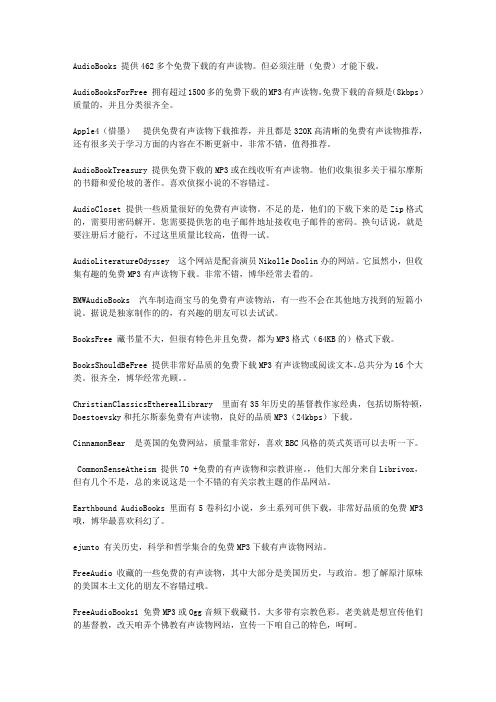
AudioBooks 提供462多个免费下载的有声读物。
但必须注册(免费)才能下载。
AudioBooksForFree 拥有超过1500多的免费下载的MP3有声读物。
免费下载的音频是(8kbps)质量的,并且分类很齐全。
Apple4(惜墨)提供免费有声读物下载推荐,并且都是320K高清晰的免费有声读物推荐,还有很多关于学习方面的内容在不断更新中,非常不错,值得推荐。
AudioBookTreasury 提供免费下载的MP3或在线收听有声读物。
他们收集很多关于福尔摩斯的书籍和爱伦坡的著作。
喜欢侦探小说的不容错过。
AudioCloset 提供一些质量很好的免费有声读物。
不足的是,他们的下载下来的是Zip格式的,需要用密码解开。
您需要提供您的电子邮件地址接收电子邮件的密码。
换句话说,就是要注册后才能行,不过这里质量比较高,值得一试。
AudioLiteratureOdyssey 这个网站是配音演员Nikolle Doolin办的网站。
它虽然小,但收集有趣的免费MP3有声读物下载。
非常不错,博华经常去看的。
BMWAudioBooks 汽车制造商宝马的免费有声读物站,有一些不会在其他地方找到的短篇小说。
据说是独家制作的的,有兴趣的朋友可以去试试。
BooksFree 藏书量不大,但很有特色并且免费,都为MP3格式(64KB的)格式下载。
BooksShouldBeFree 提供非常好品质的免费下载MP3有声读物或阅读文本。
总共分为16个大类。
很齐全,博华经常光顾。
ChristianClassicsEtherealLibrary 里面有35年历史的基督教作家经典,包括切斯特顿,Doestoevsky和托尔斯泰免费有声读物,良好的品质MP3(24kbps)下载。
CinnamonBear 是英国的免费网站,质量非常好,喜欢BBC风格的英式英语可以去听一下。
CommonSenseAtheism 提供70 +免费的有声读物和宗教讲座。
SoundBot FM Transmitter 产品说明书

The lightning flash with arrowhead symbol, within an equilateral triangle, is intended to alert the user to the presence of uninsulated “dangerous voltage” within the product’s enclosure that may be of sufficient magnitude to constitute a risk of electric shock to persons.
英语论文题目大全(精选合集)
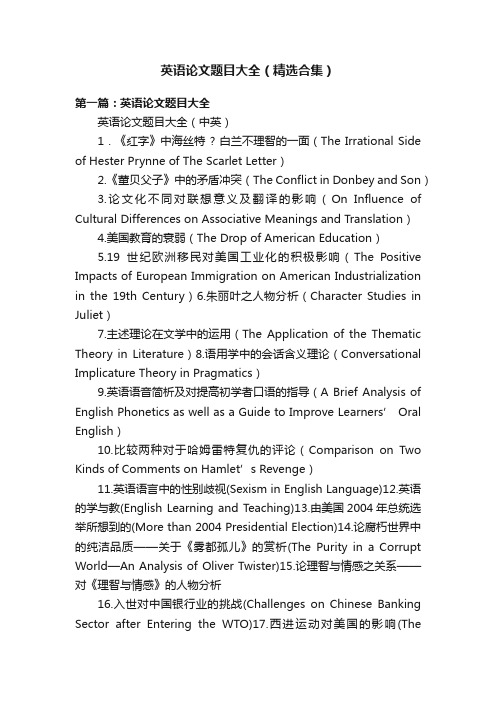
英语论文题目大全(精选合集)第一篇:英语论文题目大全英语论文题目大全(中英)1.《红字》中海丝特 ? 白兰不理智的一面(The Irrational Side of Hester Prynne of The Scarlet Letter)2.《董贝父子》中的矛盾冲突(The Conflict in Donbey and Son)3.论文化不同对联想意义及翻译的影响(On Influence of Cultural Differences on Associative Meanings and Translation)4.美国教育的衰弱(The Drop of American Education)5.19世纪欧洲移民对美国工业化的积极影响(The Positive Impacts of European Immigration on American Industrialization in the 19th Century)6.朱丽叶之人物分析(Character Studies in Juliet)7.主述理论在文学中的运用(The Application of the Thematic Theory in Literature)8.语用学中的会话含义理论(Conversational Implicature Theory in Pragmatics)9.英语语音简析及对提高初学者口语的指导(A Brief Analysis of English Phonetics as well as a Guide to Improve Learners’ Oral English)10.比较两种对于哈姆雷特复仇的评论(Comparison on Two Kinds of Comments on Hamlet’s Revenge)11.英语语言中的性别歧视(Sexism in English Language)12.英语的学与教(English Learning and Teaching)13.由美国2004年总统选举所想到的(More than 2004 Presidential Election)14.论腐朽世界中的纯洁品质——关于《雾都孤儿》的赏析(The Purity in a Corrupt World—An Analysis of Oliver Twister)15.论理智与情感之关系——对《理智与情感》的人物分析16.入世对中国银行业的挑战(Challenges on Chinese Banking Sector after Entering the WTO)17.西进运动对美国的影响(TheInfluences of Westward Movement on America)18.史蒂芬?克拉申的听读假设和二语习得(Stephen Krashen’s Input Hypothesis and Second Language Acquisition)19.艾?巴?辛格——犹太文化的守护者(L.B.Singer—the Patron of Jewish Civilization)20.二十世纪60年代美国妇女运动的派别(The Politics of American Women’s Movement in the 1960’s)21.论《红字》的模糊性(Ambiguity in The Scarlet Letter)22.《嘉莉姐妹》中无心的欲望(The Limitless Desires in Sister Carrie)23.英语广告语言修辞特点(Rhetorical Features in Advertising English)24.《儿子与情人》中的恋母情结(Pau Morel’s Oedipus Complex in Sons and Lovers)25.造成苔丝悲剧命运的原因(The Reasons for Tess’s Tragic Fate)26.论恐怖主义的根源(On the Root of Terrorism)27.2003: 中印关系新纪元(2003: A New Era of Sino-India Relationship)28.希兹克利夫的复仇(The Revenge of Heathcliff)29.弗洛伊德理论对美国现代文学的影响(The Influence of Freudian Theory on Modern American Literature)30.论萨姆一家人之“变形”(The Etamoephosis of the Samsas)31.亚伯拉罕 ? 林肯的民主思想初探(A Preliminary Research on Abraham Lincoln’s Thought of Democracy)32.评析《傲慢与偏见》的男主人公达西(Mr.Darcy in Pride and Prejudice)33.《简爱》的圣经情书(The Relationship Between Jane Eyre and the Bible)34.库区三角浮出水面——万州、开县、云阳经济宏图(The Triangle of Reservoir Region Is Surfacing—Wanzhou, Kaixian and Yunyang Open a Great Diagram of Economy)35.会话中的合作原则和礼貌原则(Cooperative Principle and Politeness Principle in Conversation)36.浅析海明威笔下圣地亚哥与其它主人公之异同(Analysis of the Similarities and Differences Between Santiago and Other Heroes by Hemingway)37.对嘉尔曼的偏见(The Prejudice Against Carmen)38.简爱——关于简爱的性格评论(Jane Eyre—A Review of Jane Eyre’s Character in Jane Eyre)39.《呼啸山庄》中凯瑟琳和希斯克力夫之间的苦痛恋情(The Suffering Love Between Catherine and Heathcliff in Wuthering Heights)40.简评妥协——研究《傲慢与偏见》(A Brief Comment on the Compromise—A Study of Pride and Prejudice)41.《傲慢与偏见》中的婚姻面面观(Analysis of the Marriages in Pride and Prejudice)42.试论简奥斯汀生活对其小说的影响(On the Impact of Jane Austen’s Life on Her Novels)43.“真实的诺言”与传统文化的碰撞——简析“真人秀”的实质和本地化过程(When True Lies Challenge Tradition—An Analysis of the Reality and Localization of Reality TV)44.从台湾问题看中美关系(The Sino-US Relation—The Taiwan Issue)45.《傲慢与偏见》的生命力(The Great Vitality of Pride and Prejudice)46.平凡中的不平凡——《傲慢与偏见》(Significance in Commonplace—Pride and Prejudice)47.萨皮尔沃夫理论(Sapir-Whorf Hypothesis)48.论格里高尔的悲剧(An Analysis of Gregor’s Tragedy)49.对大学生心理健康问题予更多关注(More Attention to the Psychological Health of College Students)50.文体学: 语言学习的科学(Stylistics: A Scientific Approach)51.佛教在西方(Buddhism in the West)52.非语言交际(Nonverbal Communication)53.国际反恐(International Anti-Terrorism)54.全球资金市场近期特征与走向(The Character and Tendency of Global Capital Market in Recent Decades)55.从《老人与海》中桑堤亚哥的性格可知——人是打不败的(A Man Cannot Be Defeated—From the Character of Santiago in The Old Man and the Sea)56.南方的失落(The Loss of the South)57.戏谑与幽默(Banter and Humor)58.《嘉莉妹妹》中的现实主义和自然主义(Realist and Naturalist Factors in Sister Carrie)59.论中国的口语教学(On Oral English Teaching in China)60.浅析英语教育中的文化教学(The T eaching of Cultures in Foreign Language Education)61.广告社会责任感诉求(Social Responsibility Concern of Advertising)62.英语中的性别歧视(Sex Discrimination in English Language)63.电影《乱世佳人》长期受到青睐的原因(Gone with the Wind – Why This Movie Has the Lasting Popularity)64.广告英语特点分析(An Analysis of Language Features in English Advertisement)65.美国青少年教育问题浅析(An Attempting Study of the Problems of American Adolescents)66.简爱自我价值的实现(The Realization of Jane Eyre’s Self-Worth)67.自由贸易与保护主义(Free Trade Versus Protectionism)68.如何在课堂上调动学生的积极性(How to Promote Motivation in the Classroom)69.在英语教学中运用“交际法”提高学生的交际能力(Using CLT in English Teac hing to Improve Students’ Communicative Competence)70.文化差异对跨文化交际的影响(The Influence of Cultural Difference Upon Cross-cultural Communication)71.论基督教对中世纪早期西欧文化的影响(On Christianity’s Influence Upon European Culture in the Early-stage Middle Ages)72.《哈克贝利费恩历险记》是一部种族主义小说吗?(The Adventures of Huckleberry Finn-a Racist Novel?)73.第二语言学习中的文化学习(Culture Learning in Second Language Learning)74.试论哈姆雷特的两个主题(On the Two Themes of Hamlet)75.谚语中的文化差异(Cultural Differences in Proverbs)76.浅谈电视暴力和儿童的关系(TV Violence and Children)77.《建设有中国特色的大众文化》(Construction of Popular Culture with Chinese Characteristics)78.理性视角看待当今文化多样性(Rational Perspectives toward Contemporary CultureDiversity)79.米切尔在《飘》中的思想矛盾(Mitchell’s Ideological Contradiction in Gone With The Wind)80.浅析马克?吐温作品之《竞选州长》(A Brief Analysis on Mark Twain’s Work Running for Governor)81.美国霸权的文化诠释(Cultural Interpretation of American Hegemony)82.中国人学习英语的语音问题(The Phonetic Problems of Chinese Students Learning English)83.传统的中国文化对中国商业的影响(The Influence of Traditional Chinese Culture on ChineseBusiness)84.《双城记》中的典型人物角色及其对主题的诠释(The Typical Characters of A Tale of Cities and Their Annotation to The Themes)85.从儒家理论角度浅谈赡养年老父母的责任(On the Filial Obligation in the Light of the Confucian Theory)86.消费需求与广告策略(Consumer Need and Advertising Strategies)87.古埃及女性的地位(The Status of Women in Ancient Egypt)88.成功的秘诀——电影《阿甘正传》的语言分析(The Secret of Success –Analysis of Forest Gump’s Language)89.文化全球化和文化民族性(Cultural Globalization and Nationality)90.儒家文化与现代教育(Confucianism and the Modern Education)91.委婉语的产生与交际功能(Social Function and Origin of Euphemism)92.对旅游市场营销的探讨(Tourism Marketing)93.《黑暗之心》的内容与主题(The Content and Theme of Heart of Darkness)94.诗词翻译中的4—R翻译理论(On the 4-R Theories in Poetry Translation)95.词组记忆单词的有效性(Vocabulary Study through Phrasal-learning)96.伊拉克战争中所体现的美国价值观(The American ValuesRepresented in the Iraq War)97.实践词汇教学法(Word Teaching through Practice)98.中国加入世贸组织对于国内旅行社的影响(The Influence on Domestic Travel Agencies of China’s Entry to World Trade Organization)99.高校校园文化及其建设(College Campus Culture and Its Construction)100.试析《了不起的盖茨比》里的象征主义手法(Symbolism in The Great Gatsby)101.大学英语阅读教学中的问题及对策(Reading Teaching in College English :Problems and Measures)102.口语课堂中引入文化教学(Add Culture Into oral English Class)103.意外结局的大师——欧?亨利(The Master of Surprising Ending—O?henry)104.浅析中国女性传播者话语权的突破(On the Breakthrough of Discourse Analysis of Chinese)105.浅析成都报业市场的竞争及启示(General Analysis of Chengdu Newspaper Market’s Competition and Enlightenment)106.机遇?挑战?——试谈报纸应对网络的冲击(Opportunity ? Challenge?—The Impact of Internet on Newspaper)107.菲茨杰拉德:“爵士乐时代”的代言人(F.Scott Fitzgerald : The Spokesman of the Jazz Age)108.霍桑的善恶观——浅析《红字》中的四个主要人物(Howthoren’s View on Good and Evil –An Analysis of the Four Major Characters in The Scarlet)109.中美文化差异之集体主义与个人主义(Collectivism and Individualism: Different Cultural Values in China and America)110.通过人物分析思考《汤姆叔叔的小屋》中的基督教理念(Christianity in Uncle Tom’s Cabin as Seen from Character Analysis)111.中美商业交往文化之差异比较(A Comparative Study ofCultural Differences in Business Communication Between Chinese and Americans)112.光荣与耻辱——英国足球文化观察(Honor and Disgrace –An Observation of the Football Culture of UK)113.《格列佛游记》中的讽刺手法(Satire in Gulliver’s Travels)114.狄更斯小说《双城记》中人道主义思想的分析(The Analysis of Dickens’ Humanitarian Sentimentality—After Reading A Tale of Two Cities)115.《大卫?科波菲尔》的人物分析(An Analysis of Good and Bad Characters in David Copperfield)116.语言歧义(Language Ambiguity)117.美国英语变体和身份(English Variety and People’s Identities in the United States)118.哈代对传统伦理道德观的批判(Hardy’s Criticism on Traditional Ethics and Morality in Tess of the D’Urbervilles)119.《汤姆?索亚》——对儿童心理的深入分析和充分展现(Tom Sawyer, Full Analysis and Display of Children’s Psychology)120.从扭曲到恢复——试析《李尔王》中的人性(From Distortion to Resuscitation –An Analysis on Human Native in King Lear)121.浅谈《美国悲剧》及物质主义的消极影响(An American Tragedy and the Negative Influence of Materialism)122.情感与语言学习——中学英语学习中焦虑情绪(Affect in Language Learning —Anxiety in Middle-school English Learning)123.一部反战小说——浅析《永别了,武器》(An Antiwar Novel –An Analysis of the Heroine in Gone with the Wind)124.哈姆雷特悲剧成因探索(What Bring About the Tragedy of Hamlet)125.透过《傲慢与偏见》看十八世纪英国绅士特点(Exploringthe Traits of English Gentlemen in the 18th Century Through Pride and Prejudice)126.论双语教育在中国的可行性——透过高新区第一实验小学的调查(The Feasibility of Bilingual Education in China—Through the Research in the NO.1 Experimental Primary School of Chongqing Hi-tech Industry Development Zone)127.评论中国英语教学与学习(A Review of English Teaching and Learning in China)128.从广告用语看美国价值观(Advertising Language as a Mirror of American Values)129.跨文化交际失败的原因(Causes of Breakdowns In Intercultural Communication)130.《傲慢与偏见》中的次要人物(Minor Characters in Pride and Prejudice)131.《印度之行》的象征意义(Symbolism in A Passage to India)132.对《动物农庄》的思考——《动物农庄》里的人物象征意义(A Thought on Animal Farm—The Symbolism of the Characters of Animal Farm)133.美国青少年犯罪与家庭的关系(The Relationships Between Family and Juvenile Delinquency in USA)134.对于老师在课堂中主体作用的思考(Reflection on The Teacher As Classroom Leader)135.两性的语言差异(Gender Difference in Language)136.中西方饮食文化比较(A Comparison Between Chinese and Western Dietetic Cultures)137.“寻找出路,但没有出路”—美国战后青年的缩影“麦田守望者”(“Find Way Out , Yet No Way Out”—A Picture of the Postwar American Youth From The Catcher in the Rye)138.圣经对西方文化的影响(The Influences of the Holy Bible on the Western Culture)139.中国妇女地位的变迁(Changes of Women’s Character)140.《了不起的盖茨比》所体现的“美国梦”的幻灭(TheCollapse of the American Dream Represented in The Great Gatsby)141.略论美国俚语(Remarks on American Slang)142.从社会透视角度来看中美文化差异(Sino-America Culture Differences from a Social Perspective)143.论《永别了,武器》中的死亡情绪(On theDeath in A Farewell to Arms)144.《第二十二条军规》的艺术特色(Artistic Features in Catch-22)145.《了不起的盖茨比》与美国梦(The Great Gatsby and the American Dream)146.创造性与课堂中的保创造性思维(Phrase Approach to Vocabulary Learning)147.文艺复兴发生在意大利的必然性(The Certainty of Renaissance Arising in Italy)148.中学英语中的多媒体技术(Multimedia Technologies in English Language Teaching in Middle School)149.冲突在文学任务塑造中的运用(On Conflicts in Characterization in Literature –A Character Analysis of the Heroine in Gone with the Wind)150.欧.亨利式结尾的艺术魅力(The Artistic Charm of O.Henry)第二篇:英语论文参考题目论文写作参考题目翻译研究方向选题1.The Great Translator Yan Fu(伟大的翻译家严复)2.Gu Hongming: A Pioneer of Translating the Chinese Classics into English(汉英翻译的先驱——辜鸿铭)3.On the Principles of Equivalence in Literary Translation(论文学翻译中的等值原则)4.A Brief Comment on E.A.Nida’s Concept o f Translation(浅谈奈达的翻译观)5.Cultural Gaps and Untranslatability(文化差异与不可译性)6.Translating and the Background Information(翻译与背景知识)7.A Preliminary Study of Explanatory Translating(解释性翻译初探)8.Translating the English Articles into Chinese(英语冠词汉译)9.Translating the English Plural Nouns into Chinese(英语复数名词汉译)10.Translating the Lengthy English Sentences into Chinese (英语长句汉译)11.On Translating English Book Titles into Chinese(谈英语书名汉译)12.A Brief Comment on the Several Chinese Versions of Jane Eyre(简评《简●爱》的几种汉译本)13.Views on the Chinese Version of Jude the Obscure: An Outstanding Example of Artistic Recreation(艺术再创造的范例——《无名的裘德》汉译本)14.Views on the Chinese Version of Emma(关于汉译本《爱玛》的几点看法)15.Translating the Style of Literary Works ——A Preliminary Study of Wu Ningkun’s Version of The Great Gatsby(文学作品的风格翻译——巫宁坤译《了不起的盖茨比》初探)16.A Comparative Study of Two Chinese Versions of The Merchant of Venice(《威尼斯商人两种汉译本比较》)17.A Reading of Fang Zhong’s Translation of The Canterbury Tales(读方重译《坎特伯雷故事集》)18.On the English Versions of Some of Du Fu’s Poems(评杜甫诗歌英译)19.Translating the Titles of Chinese Classic Poetry(中国古典诗歌标题英译)mon Errors in Translation: An Analysis(常见翻译错误分析)21.English Idioms and The Translation(英语习语的翻译)22.How to Deal with Ellipsis in Translating(翻译中如何处理省略用法)23.The Importance of Comprehension in Translating(理解对于翻译的重要性)24.The Importance of Knowledge in Translating(知识对于翻译的重要性)翻译研究参考书目选录陈富康《中国译学理论史稿》,上海外语教育出版社,1997。
【公开课课件】Unit5Listening+speaking+and+talking人教版必修第二册

will become.
• ② He is such a man full ___o_f___ energy, for which I admire him very
much.
3.soul
n.
灵魂;心灵→ souls 复数
① He dedicated himself body and soul to the education of young men.
Classic music
Blues
Chinese
traditional
Rock music
Country Pop music music
Jazz music
Classic music
Blues Rock music Pop music
Chinese traditional
Hip-hop Country music
他全身心地投入到年轻人的教育中。
② She went to pray for the soul of her late husband.
她去为亡夫的灵魂祈祷。
【话题句式】 1. Listening to music is a wonderful way for people to relax themselves when feeling stressed. 当人们感觉压力大的时候, 听音乐是一种放松自我的很棒的方式。 2. Inspired, he came up with an idea that he joined the videos together into one performance. 受到启发后, 他想到一个点子, 就是把这些视频合成为一个表演。 3. Music is playing an important part in our study and daily life. 音乐在我们的学习和日常生活中起着重要的作用。 4. I fell in love with rap music when I was a teenager. 我十几岁的时候就喜欢上了说唱音乐。
背景音乐大全

钢琴:《Kiss The Rain 雨的印记》(Yiruma) a《Tears眼泪》(The Daydream)《YOU&ME》(The Daydream)《天空之城》钢琴版 Carrying You《Merry Christmas》 wrence(坂本龙一)(最近发现湖南台周笔畅的勇往直前的广告背景配乐就是这首)《流动的城市》林海《月光边境》林海《迷失》林海《远方的寂静》林海《Canon In D》帕海贝尔《鸟之诗》钢琴版小提琴:《流浪者之歌》萨拉萨蒂《天空之城》久石让《小百合》(《云之彼端约定的地方》中的曲子)《Ave Maria圣母颂》舒伯特《D大调卡农》帕海贝尔《斗牛士之歌》萨拉萨蒂《D大调第一华丽波兰舞曲》维尼亚夫斯基《24首随想曲》帕格尼尼《G小调恰空》维塔利大提琴《天鹅》圣桑(优雅的天鹅)《G大调第1号无伴奏大提琴组曲之前奏曲》巴赫(很经典)《降B大调第九大提琴协奏曲》博凯里尼《西西里舞曲》福雷(非常有旋律性,好听的曲子啊)单簧管《单簧管波尔卡》波兰民谣《浪漫曲》圣桑(温柔的)小号《亚麻色头发的少女》德彪西《双鹰旗下进行曲》瓦格纳(进行曲)《阿莱城的姑娘之法朗多尔》比才(较有气势)《行星组曲之木星》霍尔斯特(温馨,却又有点忧伤的感觉)《小夜曲》舒伯特(小夜曲,浪漫啊)《歌之翼》门德尔松(充满着阳光的味道)长笛《a小调无伴奏长笛组曲》巴赫(这首曲子被认为是最不像长笛组曲的长笛组曲)《沉思》马斯涅(浪漫的法国风格)《培尔·金特组曲之第一组曲晨景》格里格(清新优美的小品)《阿尔比诺尼柔板》阿尔比诺尼(忧伤、沉重)以上就是自己很喜欢的好听的曲子哦,其中有古典的,也有现代的(我累啊)不过真的非常好听。
另外喜欢古典乐的话可以去看TV动画《金色琴弦》,很多著名的曲子里面都有,超喜欢的。
邱比特 instrumental/jiaoshi/gaojunying/music/qiu%20bi%20te.mp3冰莲/files/A/S/7SB1KIQ348I.mp3天空之城http://59.44.142.130/music/Y/200588/14152/505172.wmairish lullaby 爱尔兰摇篮曲/mp3/haian/3.mp3月あかりの砂のなかに/himekami/music/song/b12.wmaSleepless Beauty 清和/conan/sleeplessbeauty.mp3别人的浪漫/uuauth/138/20060922133000.mp3TVエンディングテーマhttp://61.156.7.14/upload/mp3/yydjm.mp3愿你喜欢其他清流钢琴曲/007/ape9/sample04.wma妖精之森钢琴曲/007/ape9/sample03.wma风之誓言梁邦彦/007/ape9/sample02.wma夕焼け云from 《Furusato Reborn ~ふるさと~》作曲:加羽泽美浓依然不能忘记深深打动我的第二首《晚霞》/007/ape9/12eveningglow.wma静寂from 《香》作曲:菅井爱里这是一片无人的山林/007/ape9/11Silence.wma红叶from 《Tofu 东风》作曲:巨势典子“落红不是无情物,化作春泥更护花”,站在古树旁,仰望枝头的红叶,飘下万千感慨。
慢速生活英语口语广播04:砍价(MP3下载)
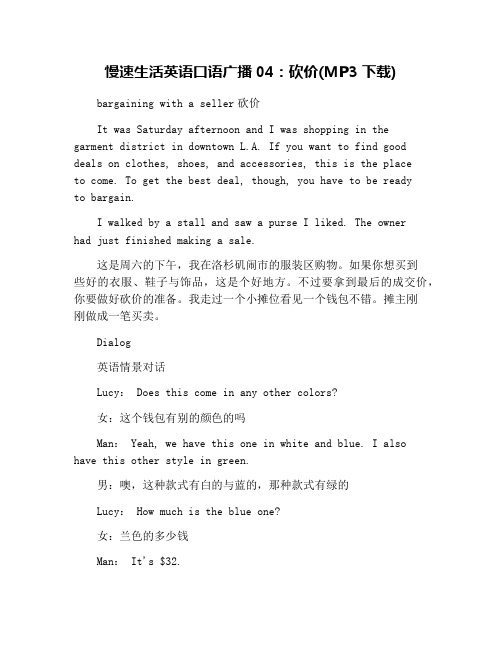
慢速生活英语口语广播04:砍价(MP3下载)bargaining with a seller砍价It was Saturday afternoon and I was shopping in the garment district in downtown L.A. If you want to find good deals on clothes, shoes, and accessories, this is the placeto come. To get the best deal, though, you have to be readyto bargain.I walked by a stall and saw a purse I liked. The ownerhad just finished making a sale.这是周六的下午,我在洛杉矶闹市的服装区购物。
如果你想买到些好的衣服、鞋子与饰品,这是个好地方。
不过要拿到最后的成交价,你要做好砍价的准备。
我走过一个小摊位看见一个钱包不错。
摊主刚刚做成一笔买卖。
Dialog英语情景对话Lucy: Does this come in any other colors?女:这个钱包有别的颜色的吗Man: Yeah, we have this one in white and blue. I also have this other style in green.男:噢,这种款式有白的与蓝的,那种款式有绿的Lucy: How much is the blue one?女:兰色的多少钱Man: It's $32.男:32美金Lucy: $32? What about the green one?女:32美金?那绿的多少钱Man: That's $30.男:30美金Lucy: That seems a little high. Can you do better on the price?女:还是有点贵,能更便宜点吗Man: This is a designer bag and it's good quality. It's a bargain at that price.男:这个包是新款式而且质量很好,这已经是折让的价格了Lucy: Is that your best offer?女:这是最低的价格了吗Man: That's the best I can do.男:是,我是我能给的了Lucy: Well, I don't know. I think I'll shop around.女:那也许吧,反过来我还得四处逛逛Man: Okay, how about $28.男:好吧,28美金如何Lucy: That's still more than I wanted to spend. What if I take the blue one and the green one?女:还是比我期望的贵。
雅思口语舞蹈基本介绍 (1)
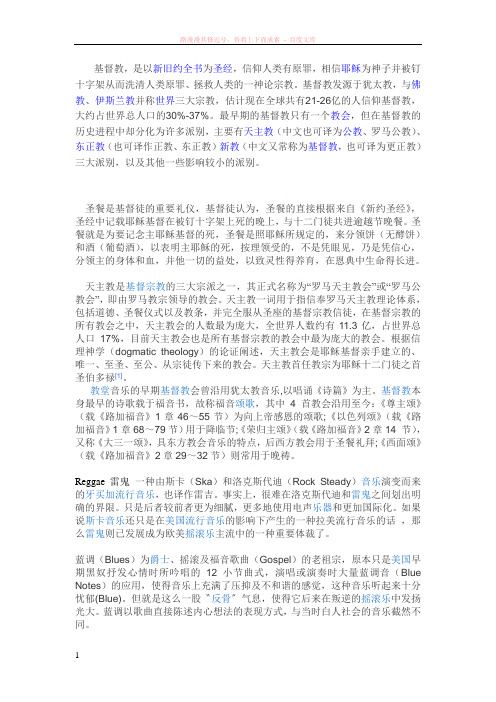
基督教,是以新旧约全书为圣经,信仰人类有原罪,相信耶稣为神子并被钉十字架从而洗清人类原罪、拯救人类的一神论宗教。
基督教发源于犹太教,与佛教、伊斯兰教并称世界三大宗教,估计现在全球共有21-26亿的人信仰基督教,大约占世界总人口的30%-37%。
最早期的基督教只有一个教会,但在基督教的历史进程中却分化为许多派别,主要有天主教(中文也可译为公教、罗马公教)、东正教(也可译作正教、东正教)新教(中文又常称为基督教,也可译为更正教)三大派别,以及其他一些影响较小的派别。
圣餐是基督徒的重要礼仪,基督徒认为,圣餐的直接根据来自《新约圣经》,圣经中记载耶稣基督在被钉十字架上死的晚上,与十二门徒共进逾越节晚餐。
圣餐就是为要记念主耶稣基督的死,圣餐是照耶稣所规定的,来分领饼(无酵饼)和酒(葡萄酒),以表明主耶稣的死,按理领受的,不是凭眼见,乃是凭信心,分领主的身体和血,并他一切的益处,以致灵性得养育,在恩典中生命得长进。
天主教是基督宗教的三大宗派之一,其正式名称为“罗马天主教会”或“罗马公教会”,即由罗马教宗领导的教会。
天主教一词用于指信奉罗马天主教理论体系,包括道德、圣餐仪式以及教条,并完全服从圣座的基督宗教信徒,在基督宗教的所有教会之中,天主教会的人数最为庞大,全世界人数约有11.3亿,占世界总人口17%,目前天主教会也是所有基督宗教的教会中最为庞大的教会。
根据信理神学(dogmatic theology)的论证阐述,天主教会是耶稣基督亲手建立的、唯一、至圣、至公、从宗徒传下来的教会。
天主教首任教宗为耶稣十二门徒之首圣伯多禄[1]。
教堂音乐的早期基督教会曾沿用犹太教音乐,以唱诵《诗篇》为主。
基督教本身最早的诗歌载于福音书,故称福音颂歌,其中 4 首教会沿用至今:《尊主颂》(载《路加福音》1章46~55节)为向上帝感恩的颂歌;《以色列颂》(载《路加福音》1章68~79节)用于降临节;《荣归主颂》(载《路加福音》2章14 节),又称《大三一颂》,具东方教会音乐的特点,后西方教会用于圣餐礼拜;《西面颂》(载《路加福音》2章29~32节)则常用于晚祷。
关于锻炼和音乐的英语口语
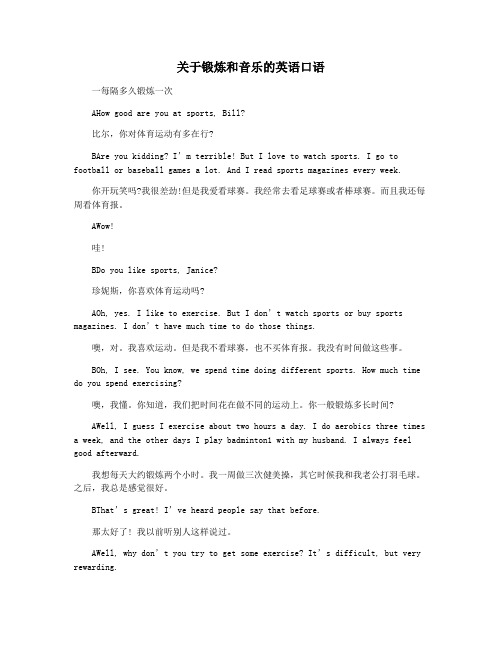
关于锻炼和音乐的英语口语一每隔多久锻炼一次AHow good are you at sports, Bill?比尔,你对体育运动有多在行?BAre you kidding? I’m terrible! But I love to watch sports. I go to football or baseball games a lot. And I read sports magazines every week.你开玩笑吗?我很差劲!但是我爱看球赛。
我经常去看足球赛或者棒球赛。
而且我还每周看体育报。
AWow!哇!BDo you like sports, Janice?珍妮斯,你喜欢体育运动吗?AOh, yes. I like to exercise. But I don’t watch sports or buy sports magazines. I don’t have much time to do those things.噢,对。
我喜欢运动。
但是我不看球赛,也不买体育报。
我没有时间做这些事。
BOh, I see. You know, we spend time doing different sports. How much time do you spend exercising?噢,我懂。
你知道,我们把时间花在做不同的运动上。
你一般锻炼多长时间?AWell, I guess I exercise about two hours a day. I do aerobics three times a week, and the other days I play badminton1 with my husband. I always feel good afterward.我想每天大约锻炼两个小时。
我一周做三次健美操,其它时候我和我老公打羽毛球。
之后,我总是感觉很好。
BThat’s great! I’ve heard people say that before.那太好了! 我以前听别人这样说过。
- 1、下载文档前请自行甄别文档内容的完整性,平台不提供额外的编辑、内容补充、找答案等附加服务。
- 2、"仅部分预览"的文档,不可在线预览部分如存在完整性等问题,可反馈申请退款(可完整预览的文档不适用该条件!)。
- 3、如文档侵犯您的权益,请联系客服反馈,我们会尽快为您处理(人工客服工作时间:9:00-18:30)。
慢速生活英语口语广播35:流行与爵士音乐 (MP3下
载)
pop and jazz music流行与爵士音乐
Dialog
英语情景对话
Abby: Hey, what are you listening to?
女:嘿,听什么呢
Bill: Right now I'm listening to the Foo Fighters'
latest album. There are some really good tracks on this CD, including their new single.
男:我正在听福战士最新的专辑呢。
这张CD中有几首真棒,还
有他们的单曲。
Abby: Let me see your iPod for a minute. It looks like you've got a ton of good stuff loaded up. I like Gwen Stephanie, too, and what's this? Shakira? I had no idea you were a fan of hers.
女:让我看看你的IPOD。
你好象装了无数的好东西在里面呀。
我喜欢斯蒂芬,这是什么?沙基拉吗?我都不知道你还是她的歌迷呀
Bill: I think she's a really talented singer and songwriter. And, well, she's hot, too.
男:我觉得她是一个非常有天赋的歌手与歌曲写手。
另外,她还
很性感
Abby: Yeah, I bet. Let's see. You've got some great jazz and blues standards here, too. Charlie Parker, Duke Ellington,
and Billie Holiday. This one is a live recording, and these are compilations. You've got their greatest hits and some bootleg stuff, too. I never knew you were such a jazz buff.
女:噢,也许吧。
我看看还有什么,你这还有一些很棒的爵士与布布鲁斯音乐呀。
查理派克,杜克艾灵顿,还有比利假日。
这是一个现场的录音,这些是专辑。
你还有最热闹的歌曲及一些未正式出版音乐版本。
我以前都不知道你还是这样一个爵士乐迷呢
Bill: Yeah, I like all kinds of music. Now, where are you going with my iPod?
男:是,我喜欢各种音乐。
嘿,你要将我的IPOD拿到哪去呀
Abby: I thought I'd just borrow it for a little while.
女:我是想也许借你的IPOD听几天
Bill: Yeah, right. Hand it over. I've got to download my favorite podcast.
男:那不行,还给我,我还得下载我最喜欢的播客呢。
